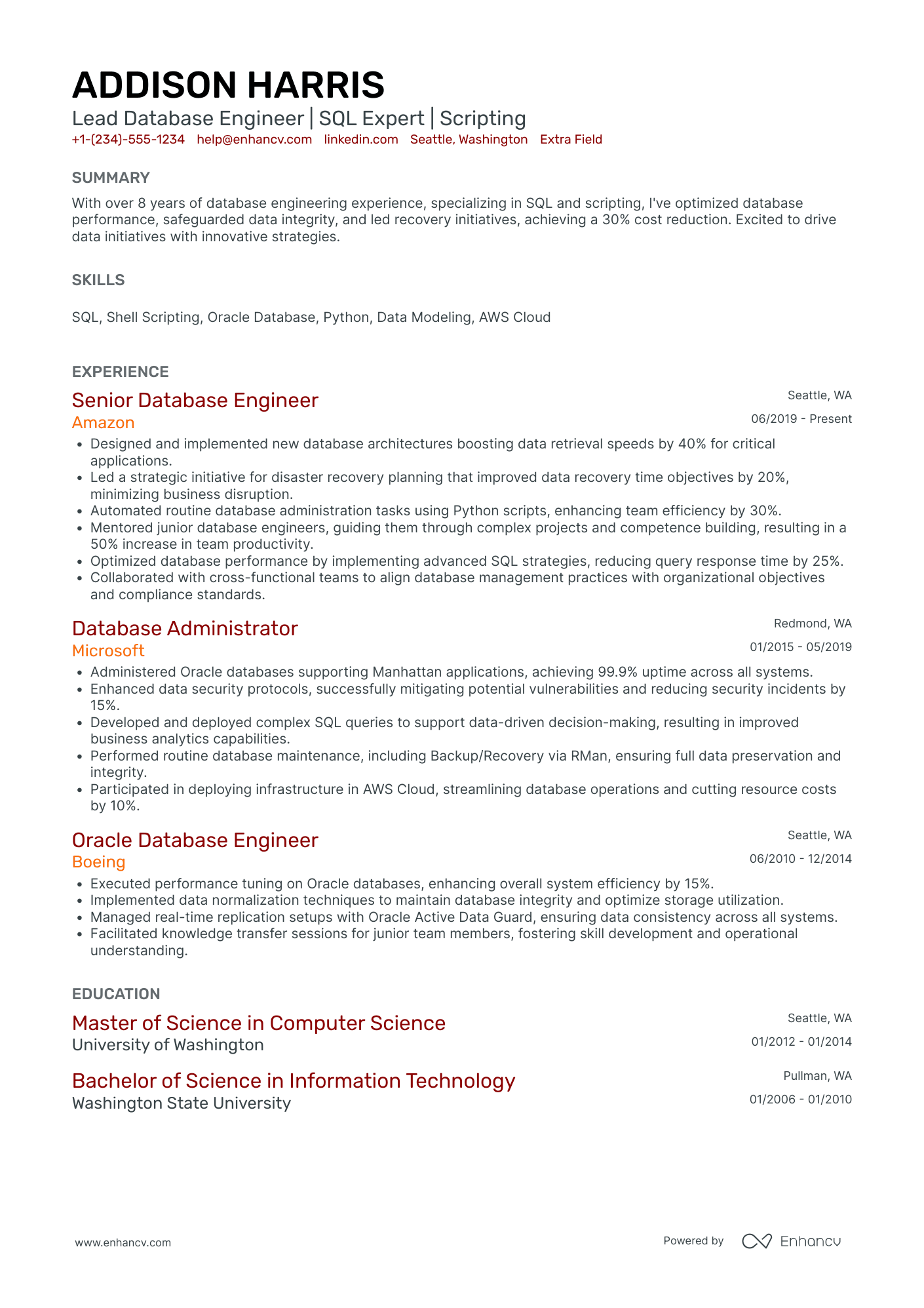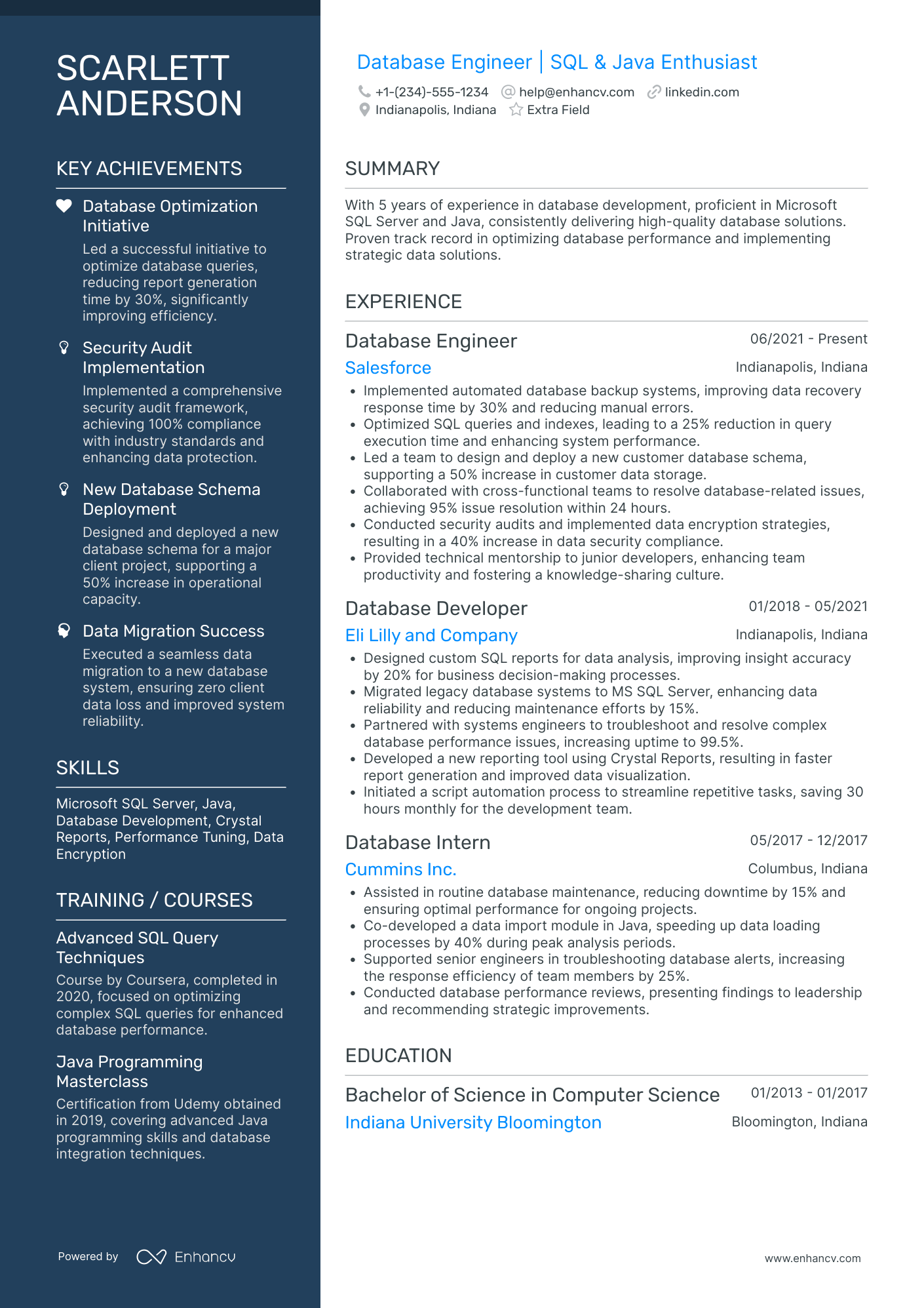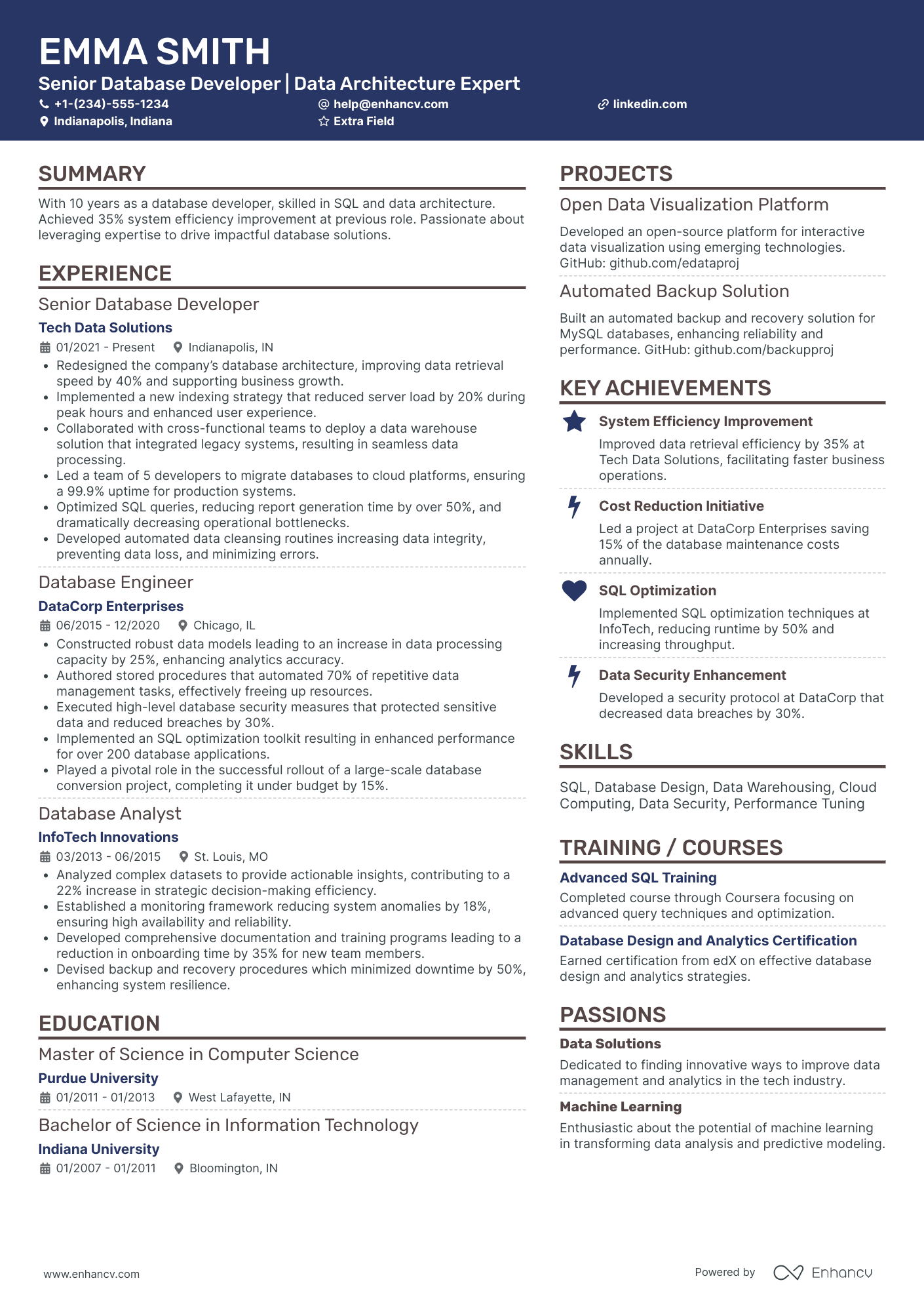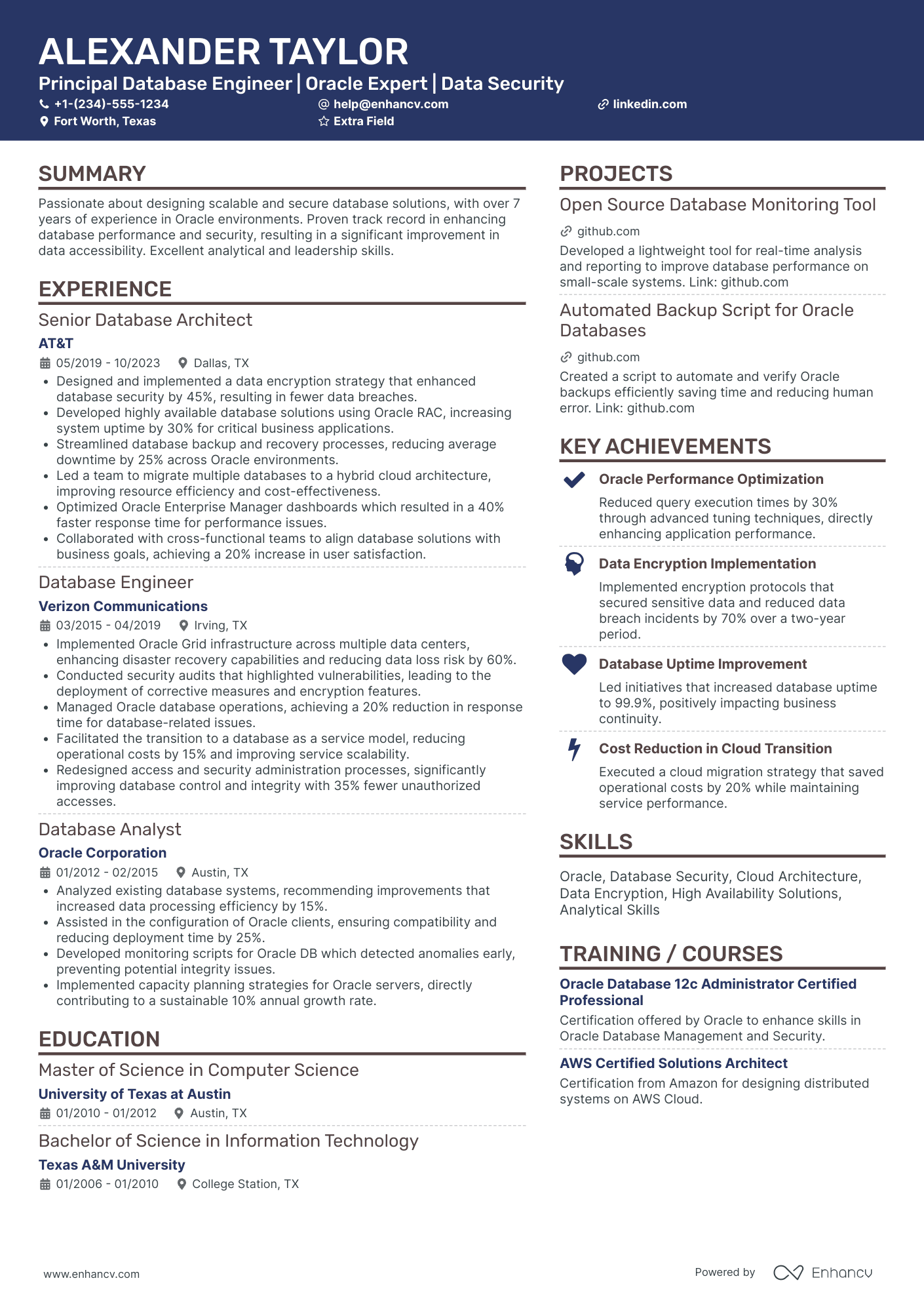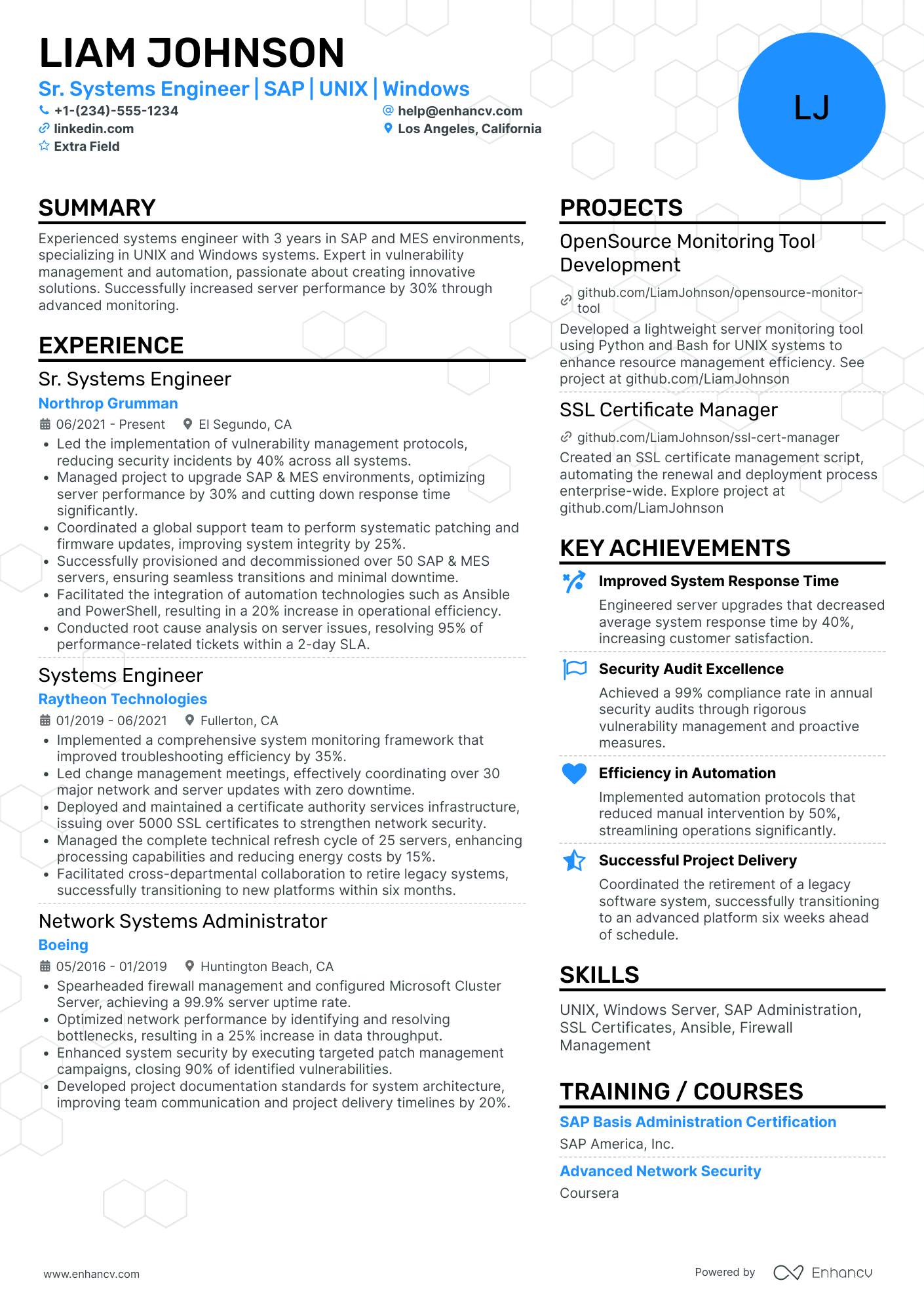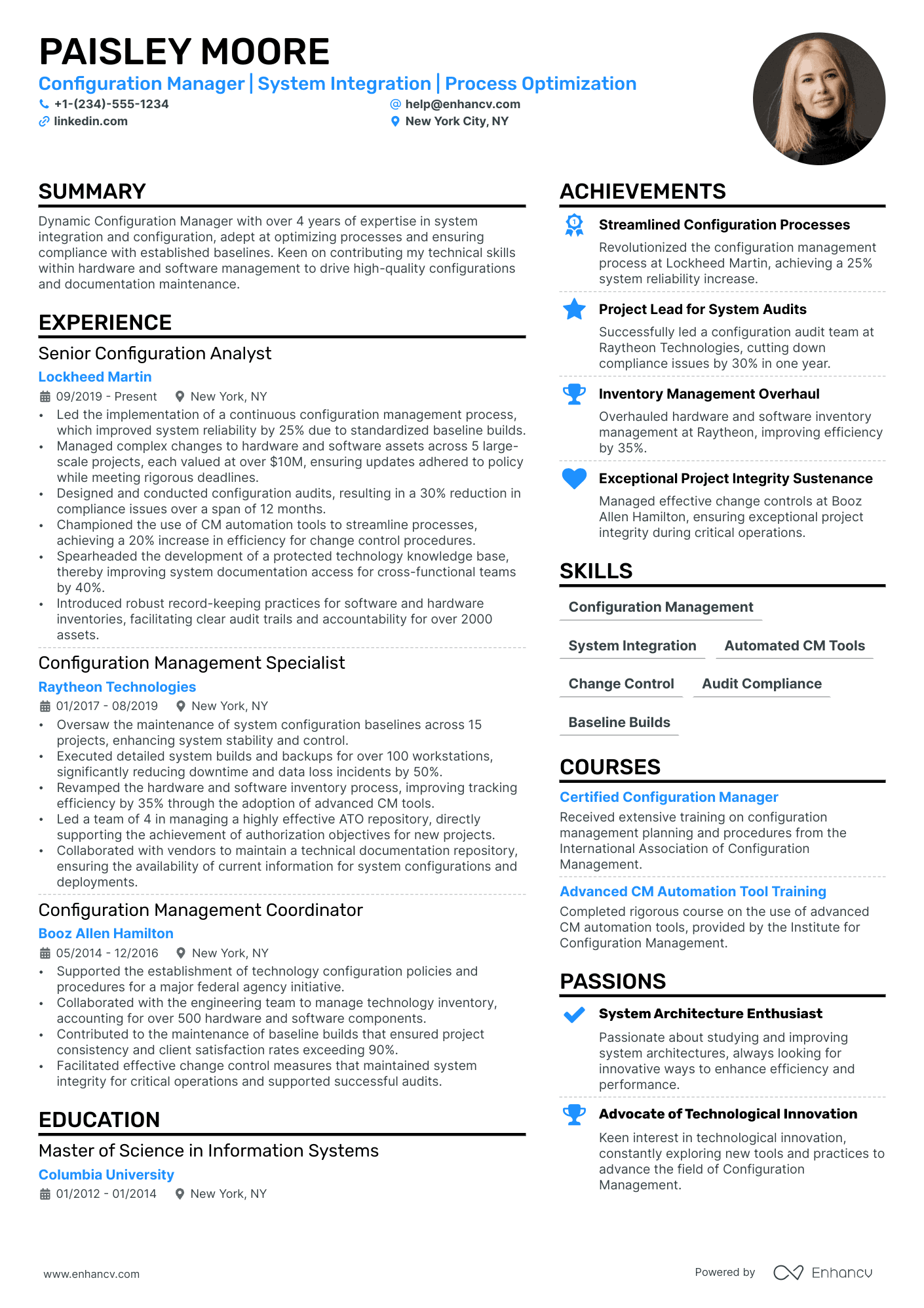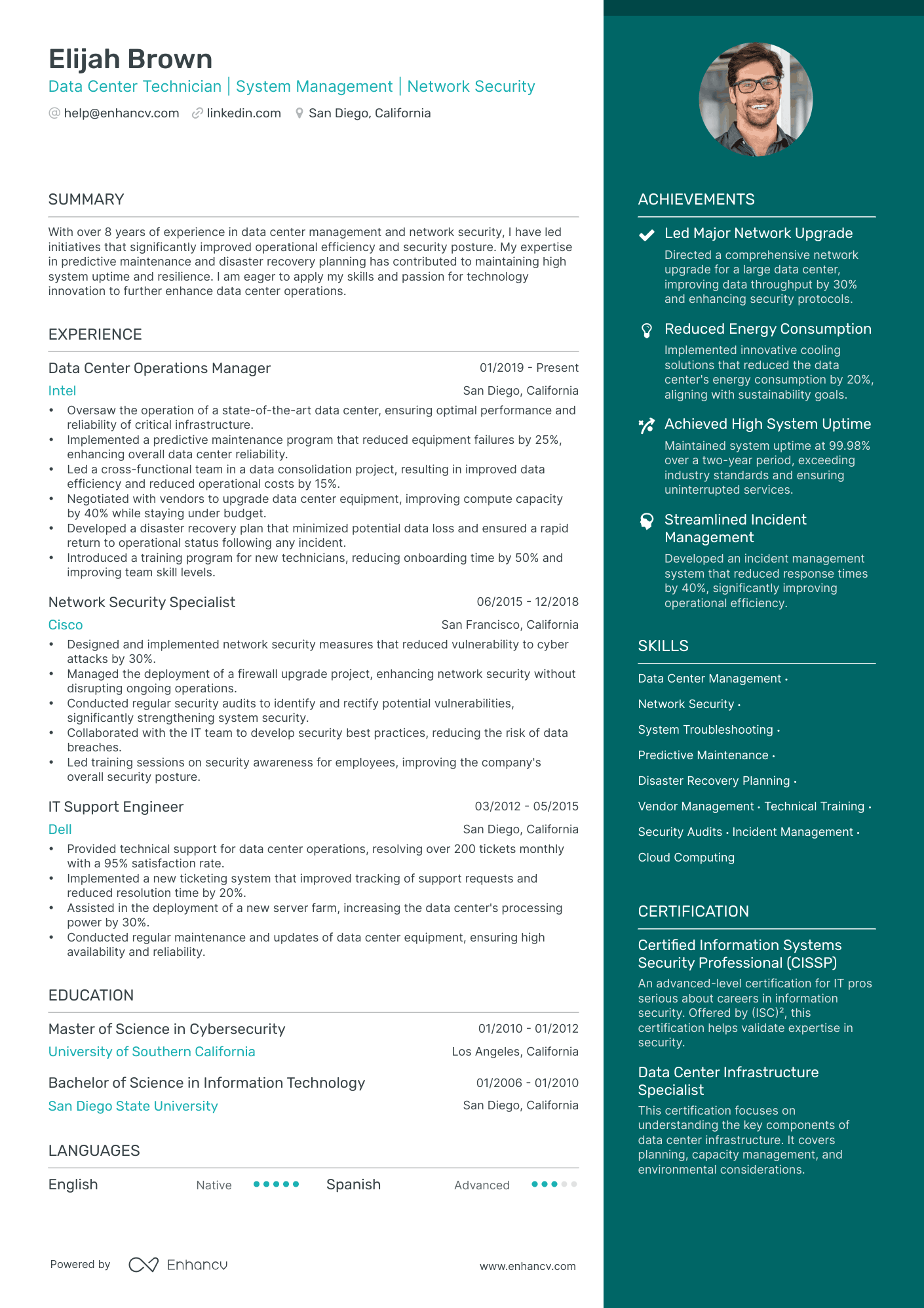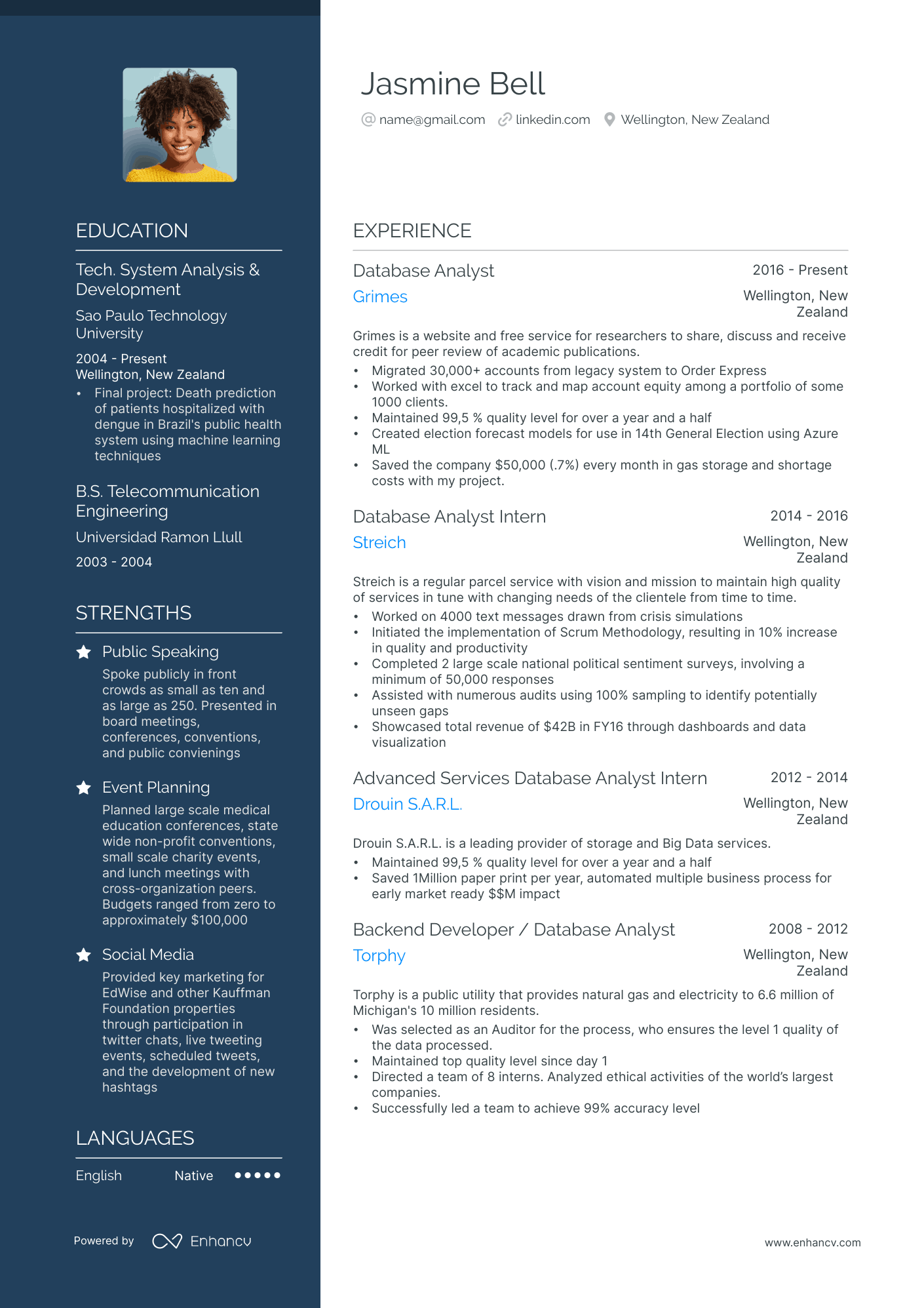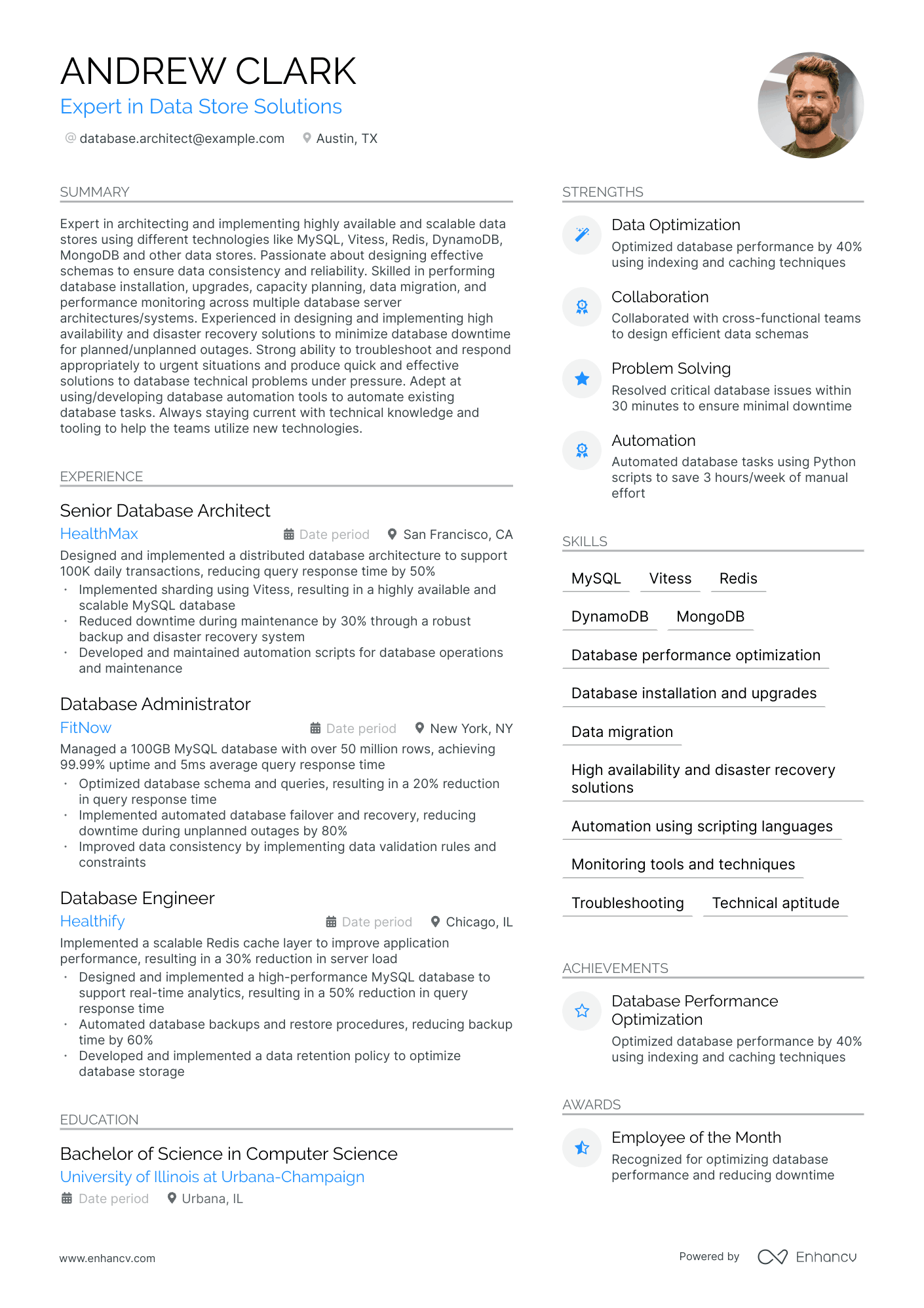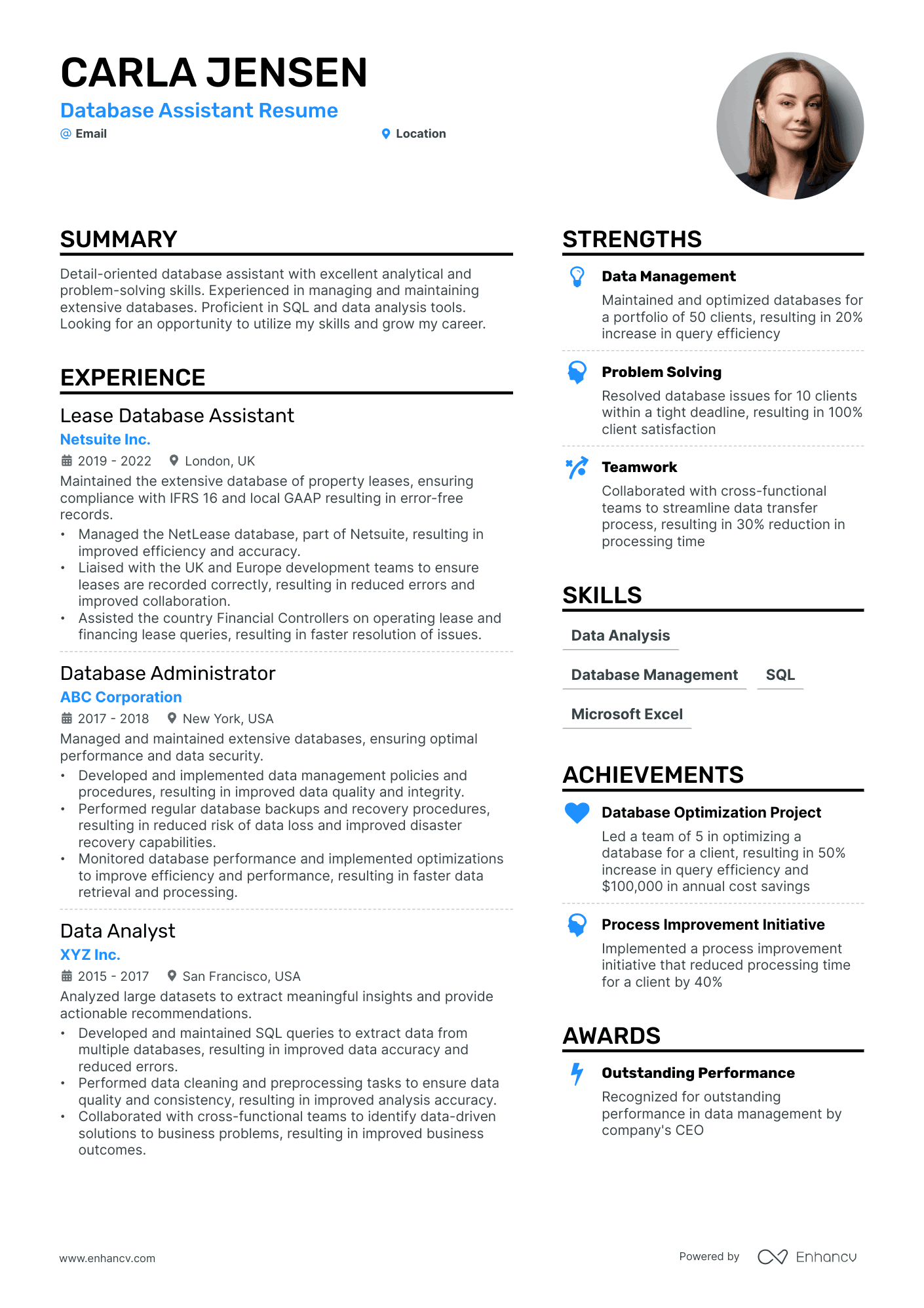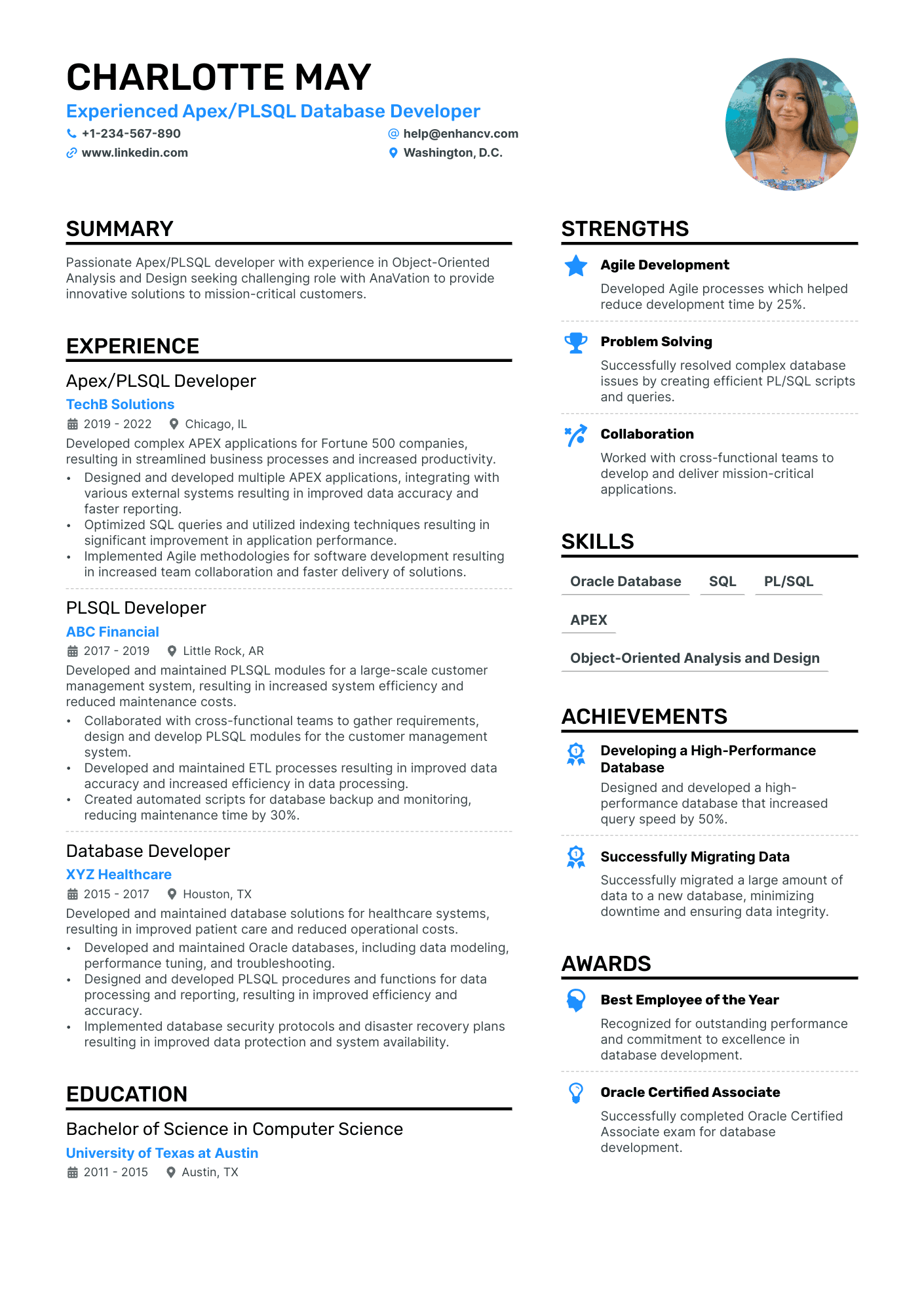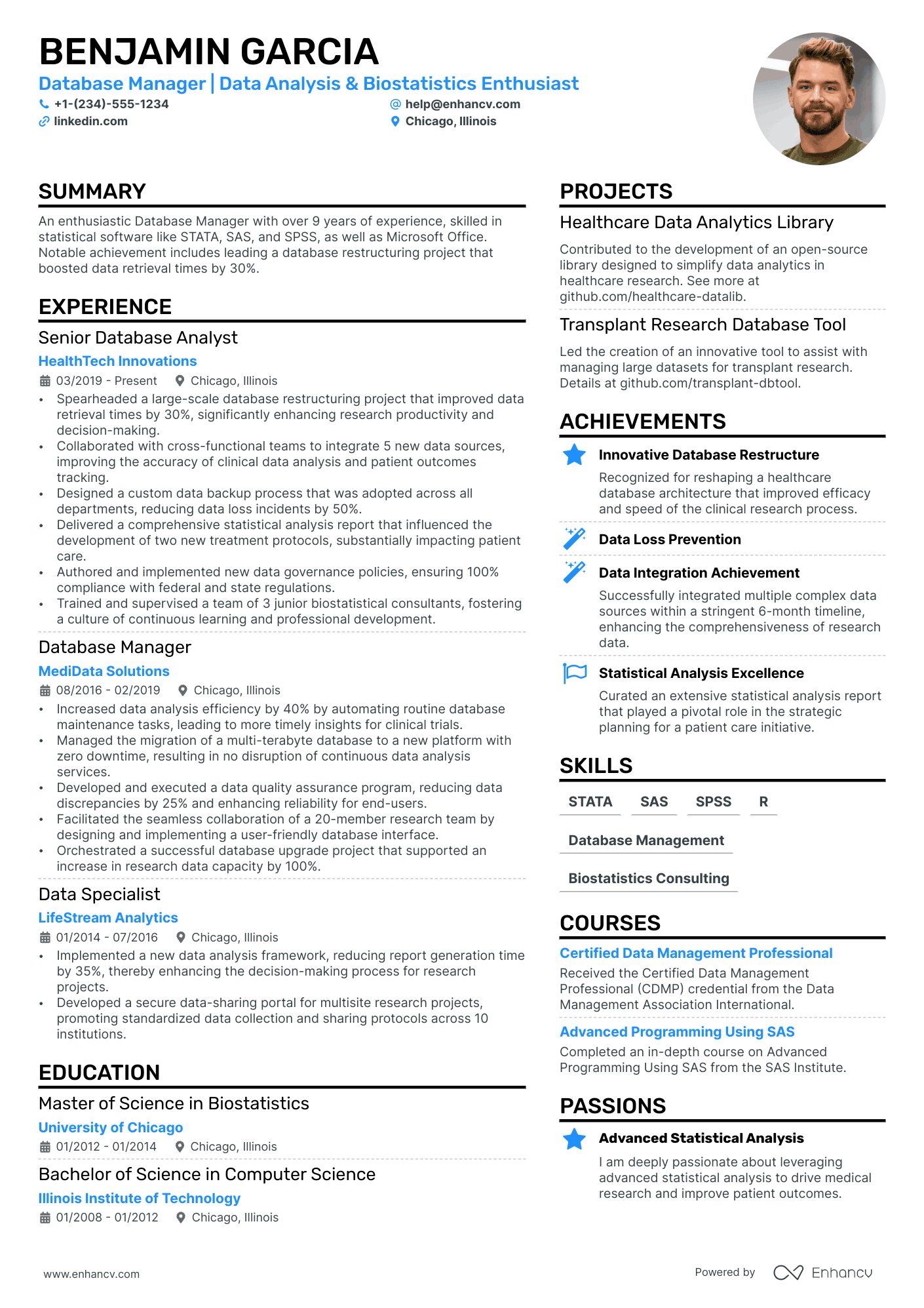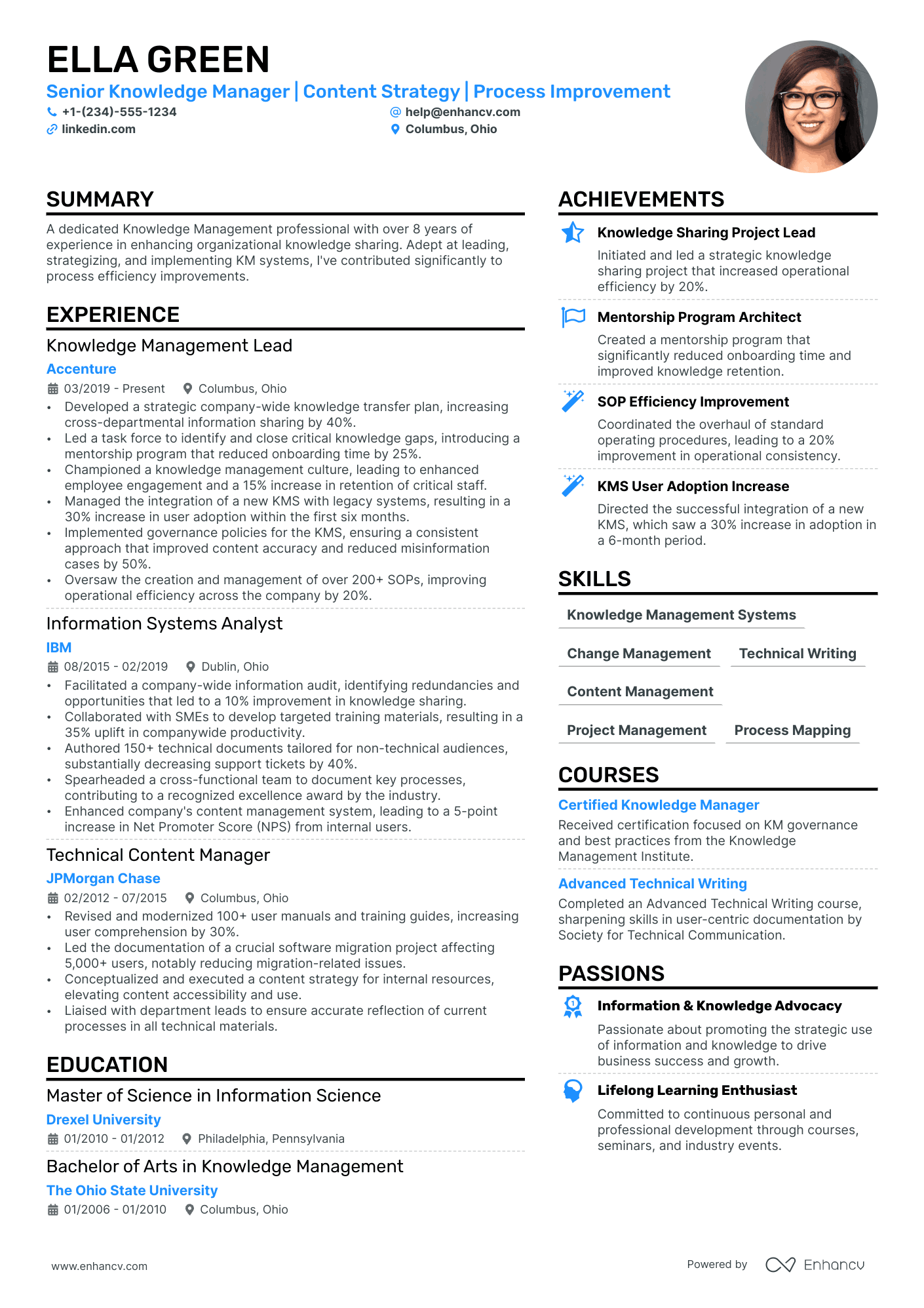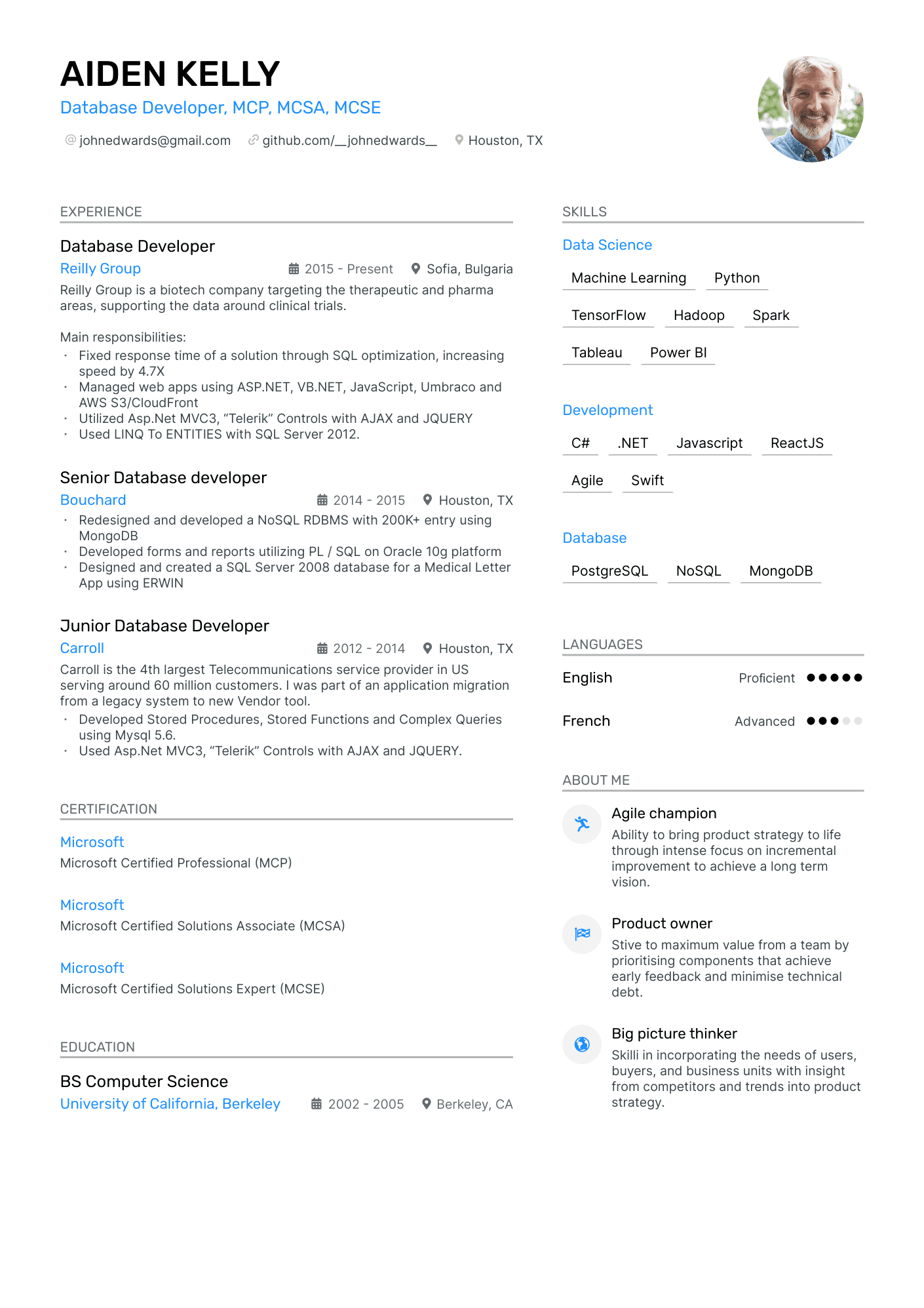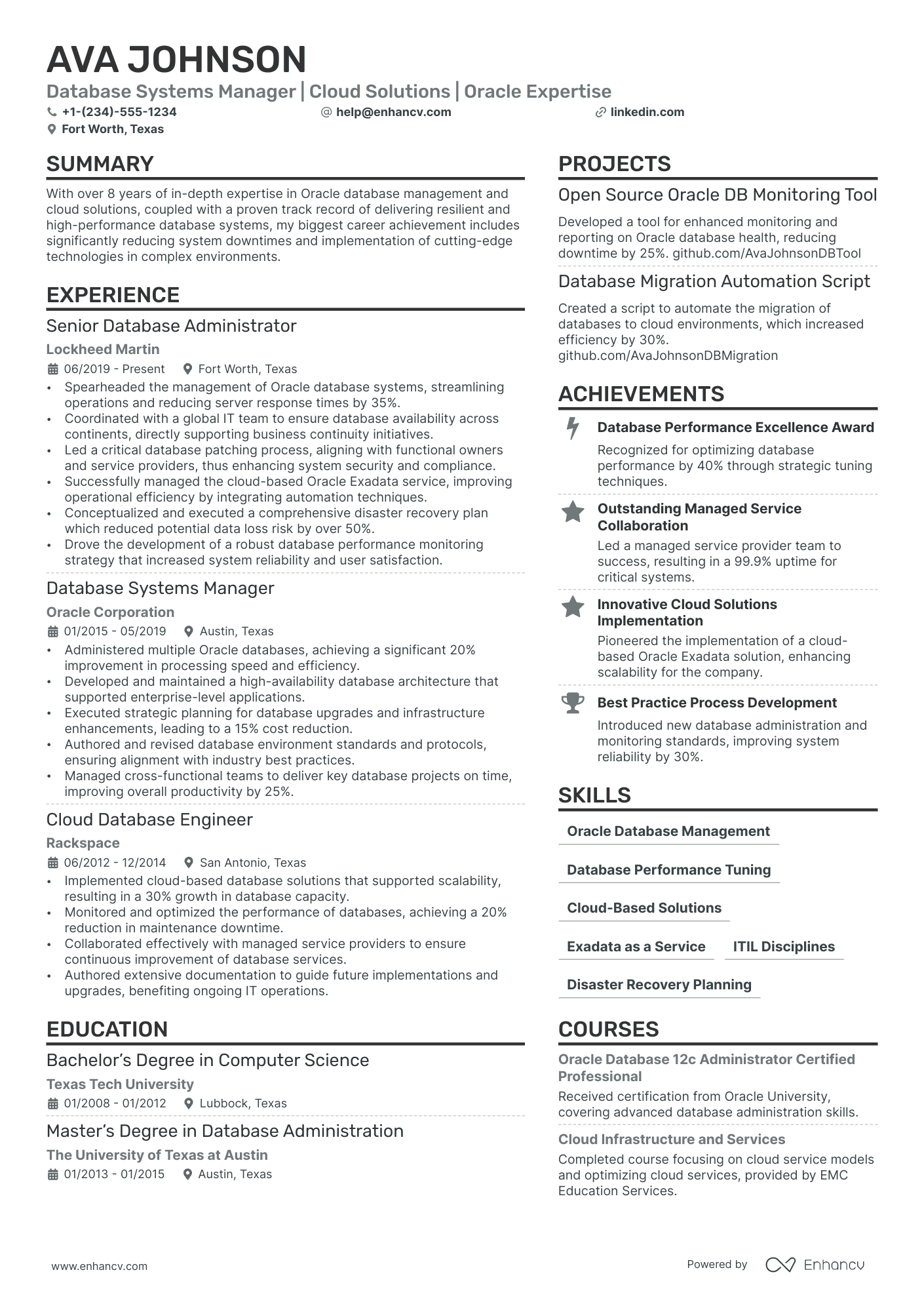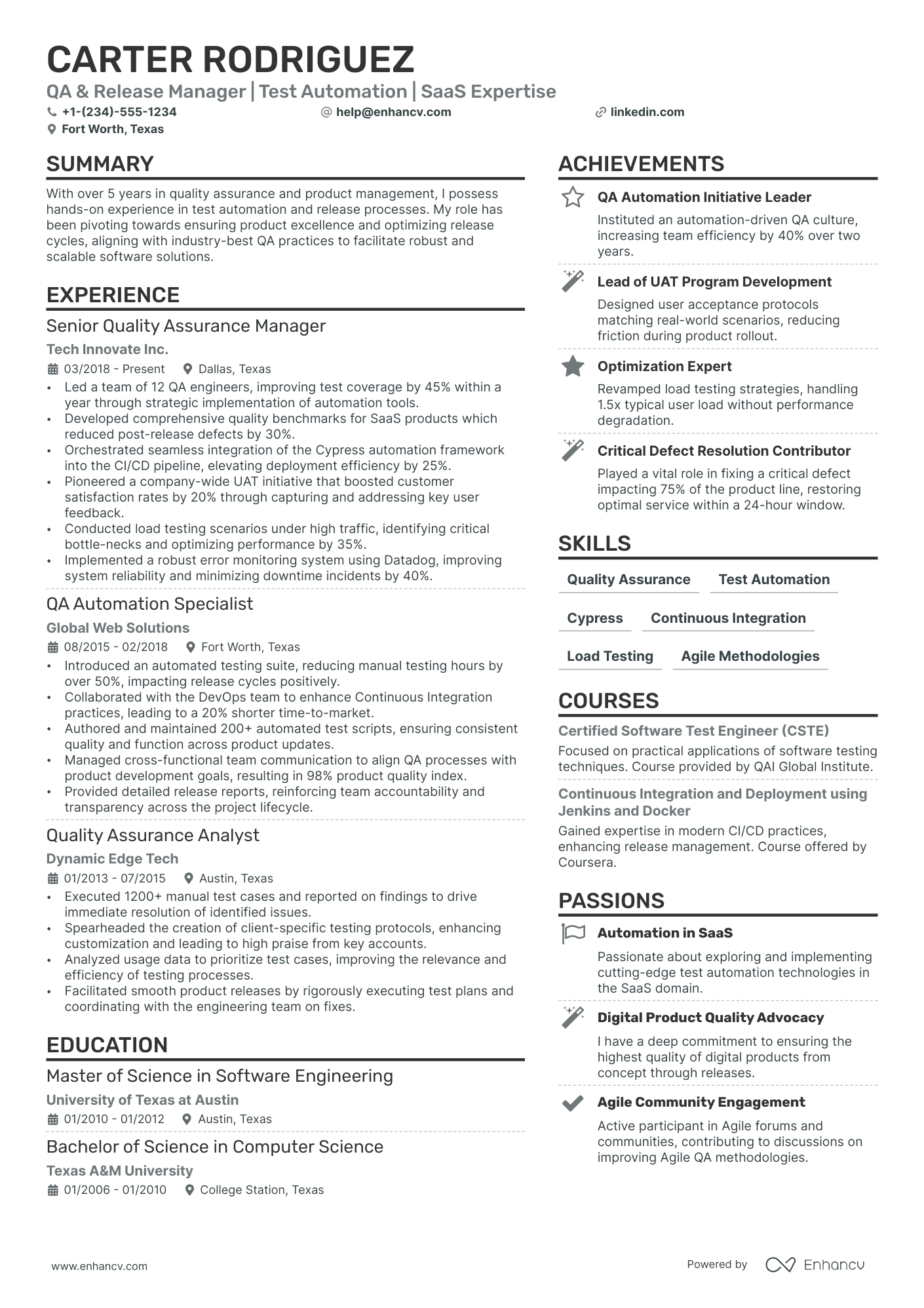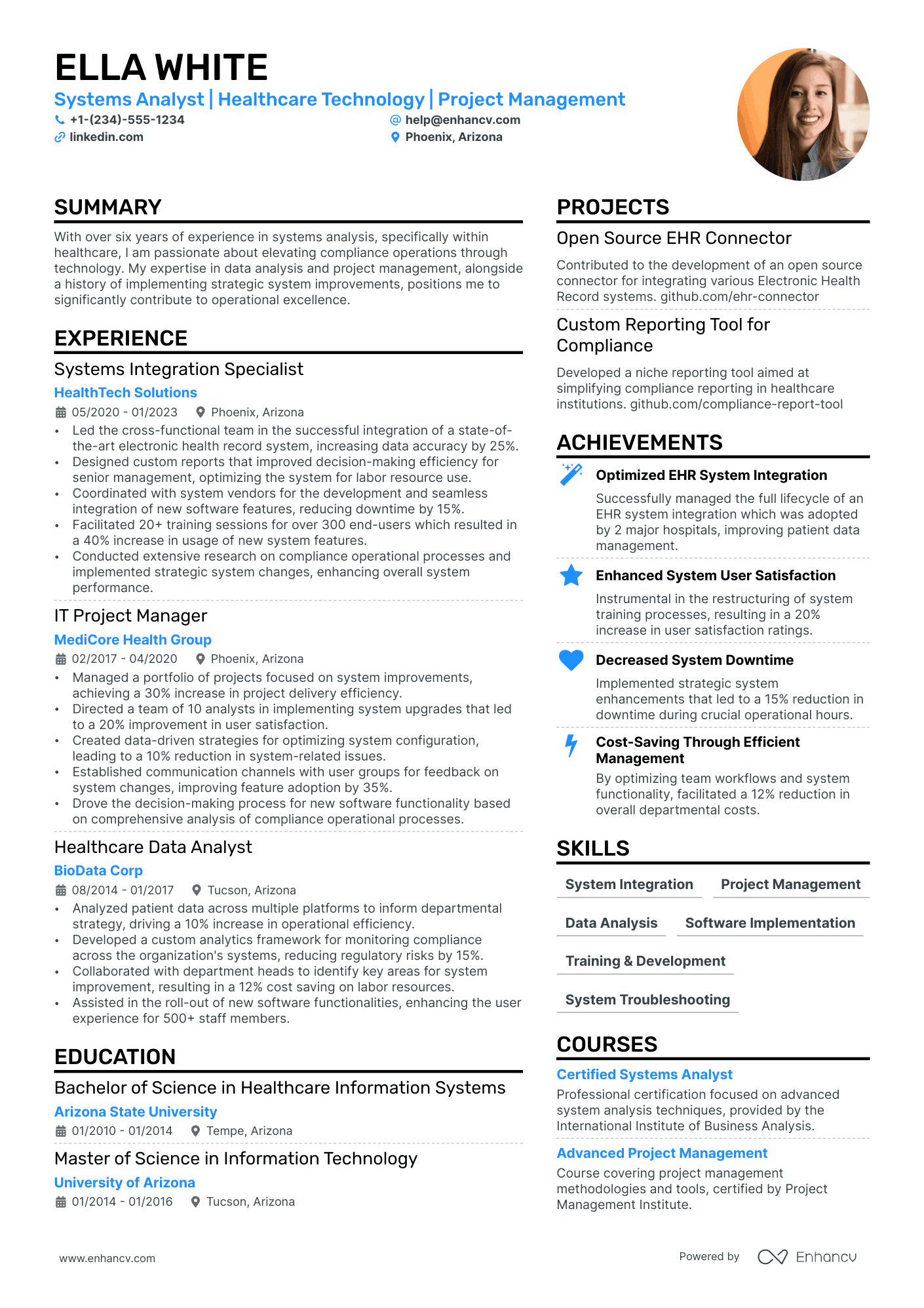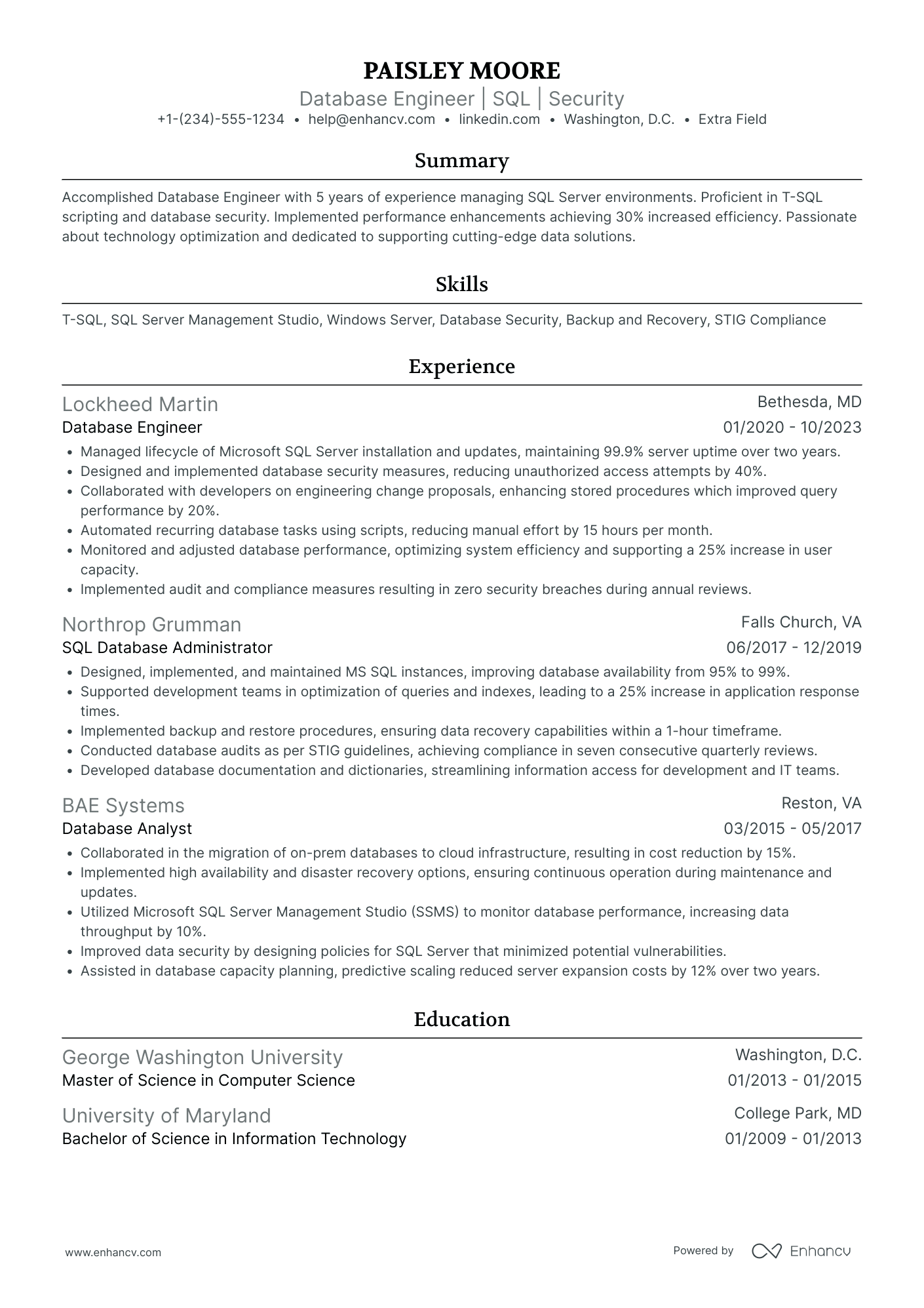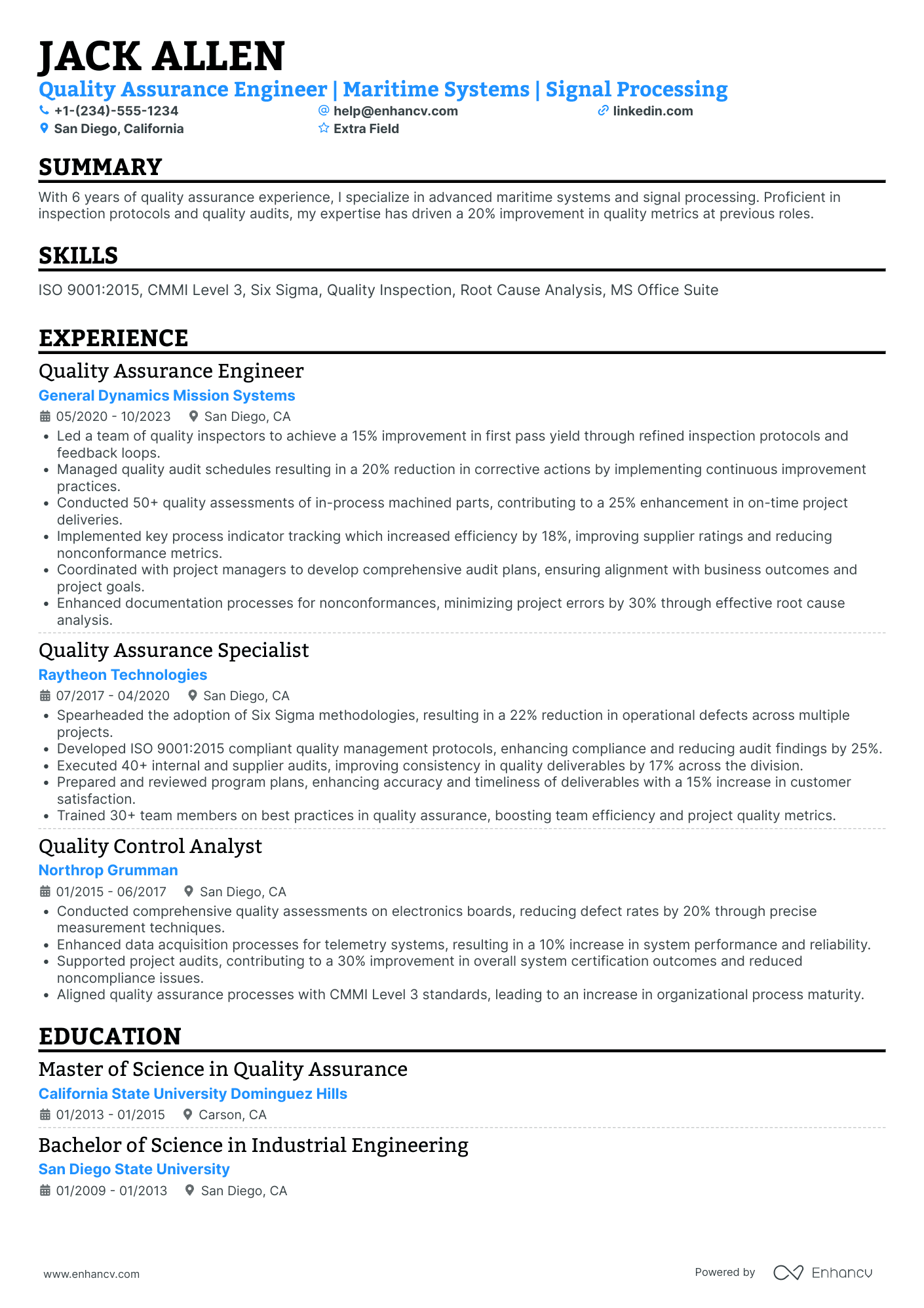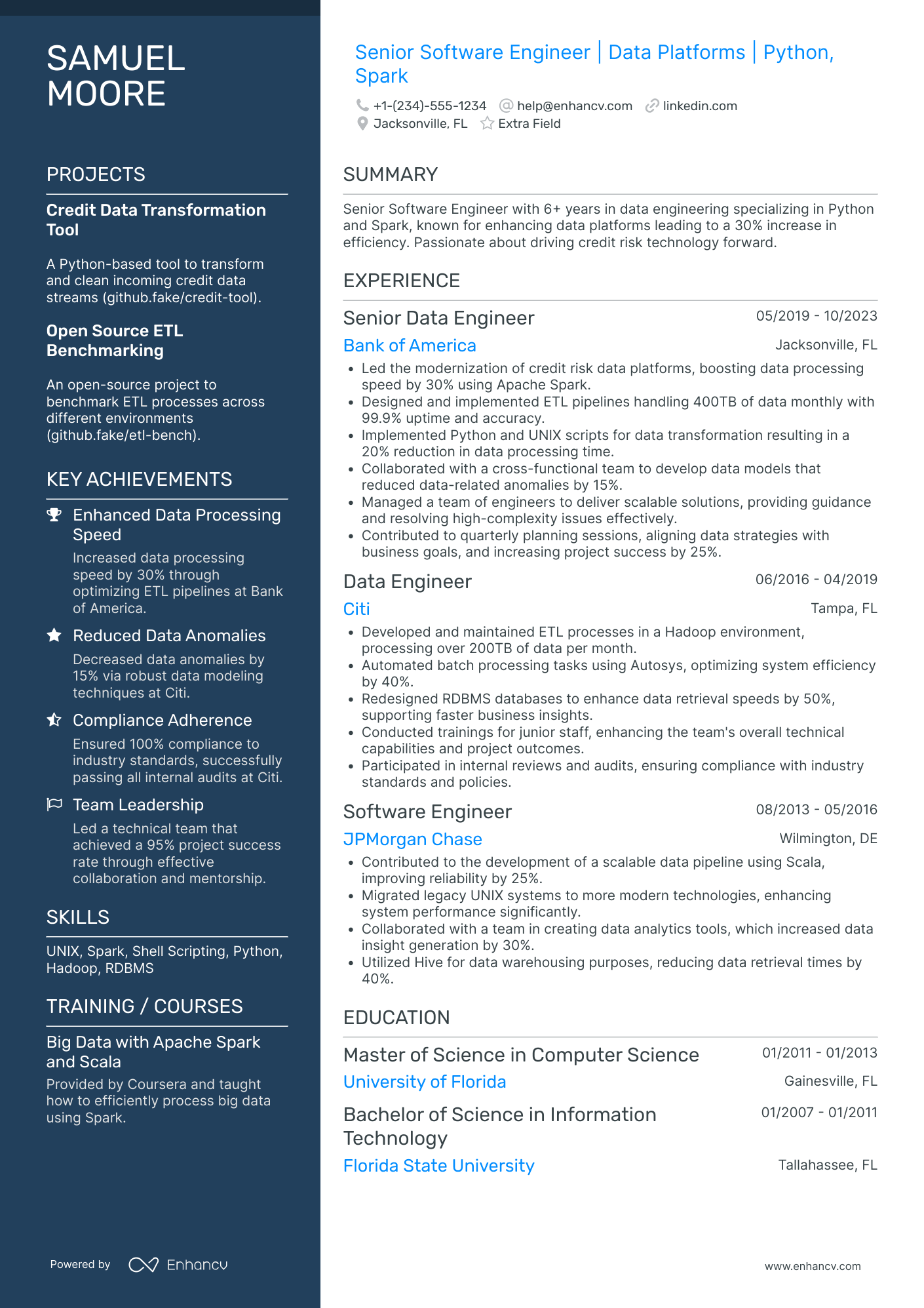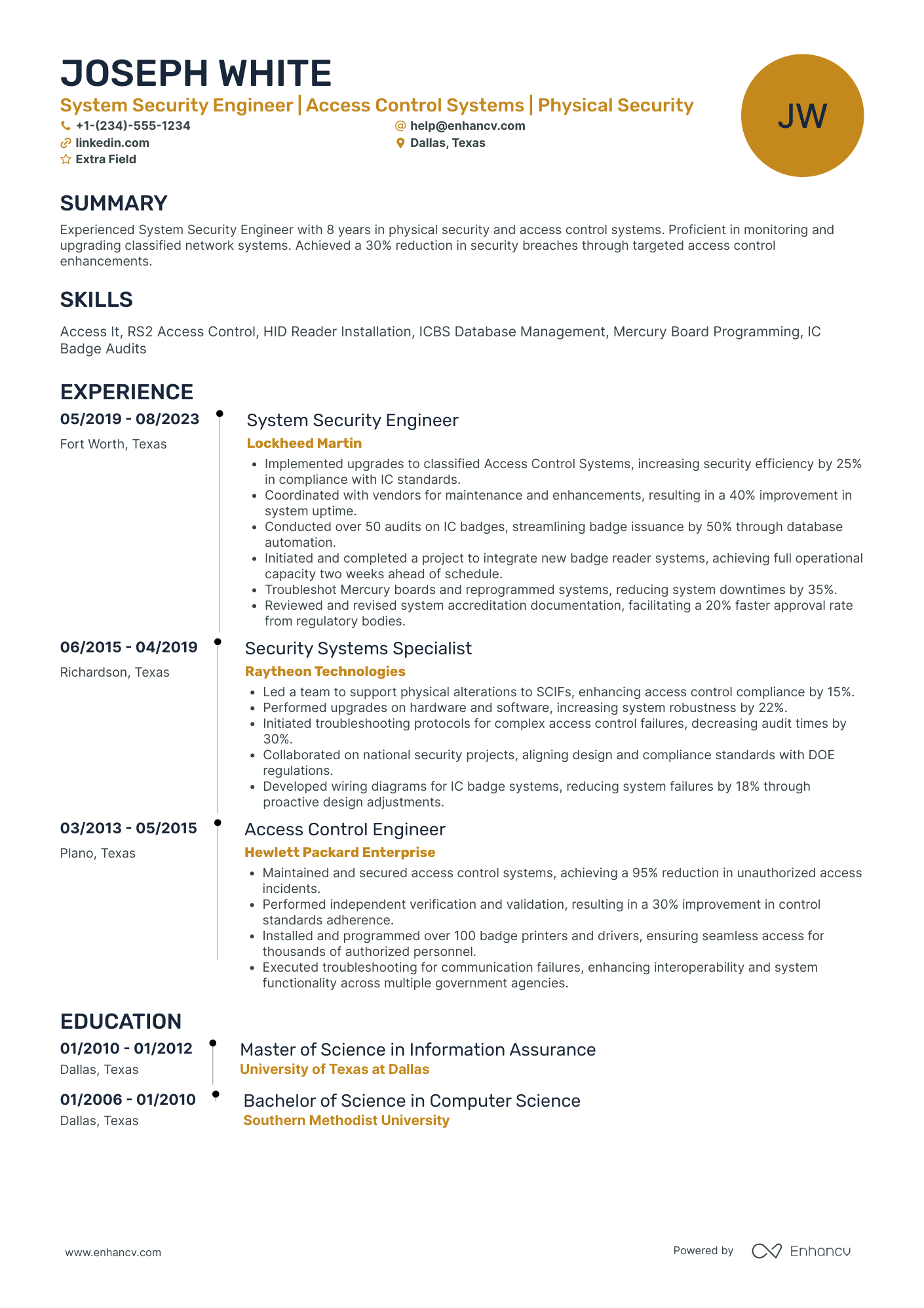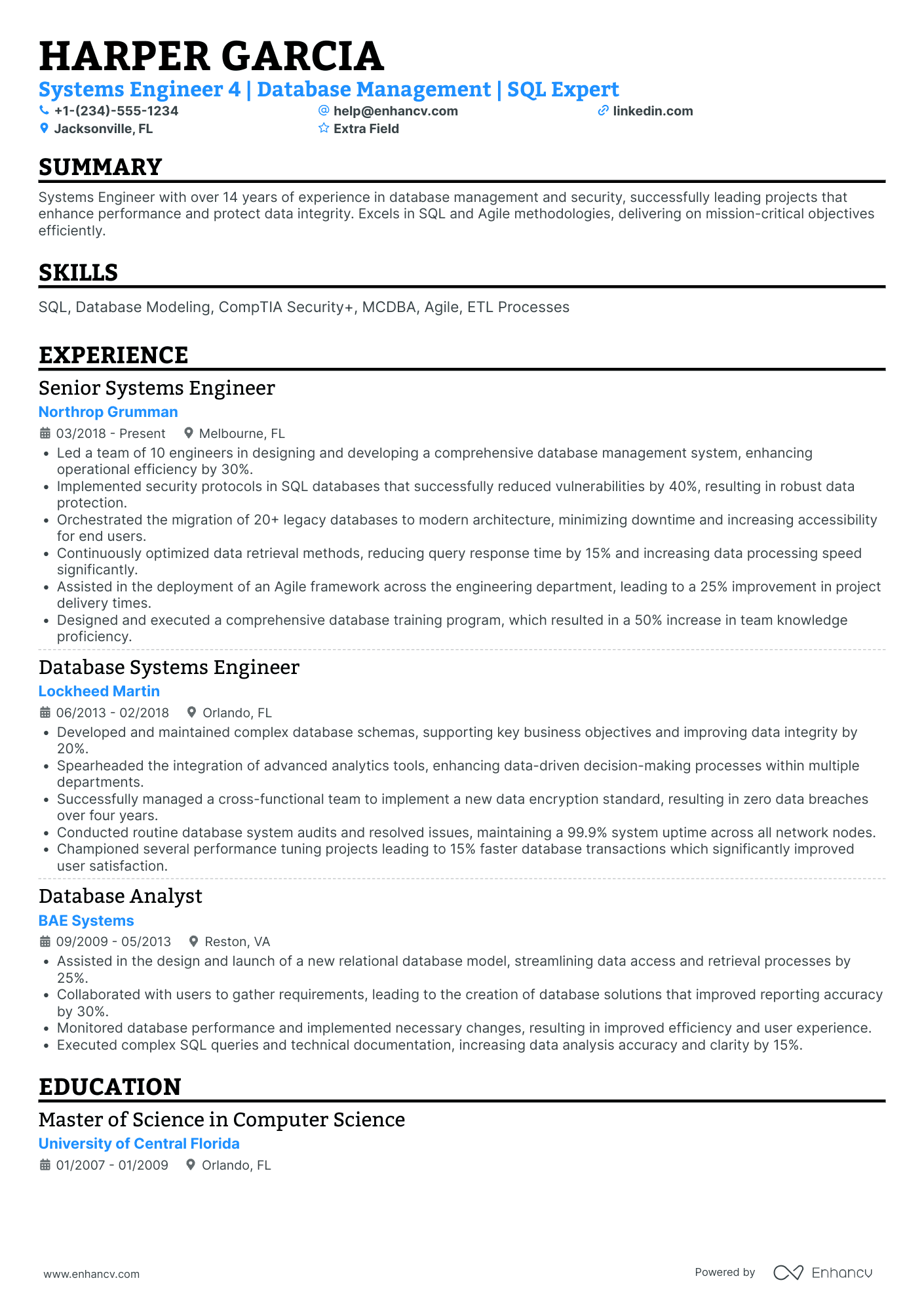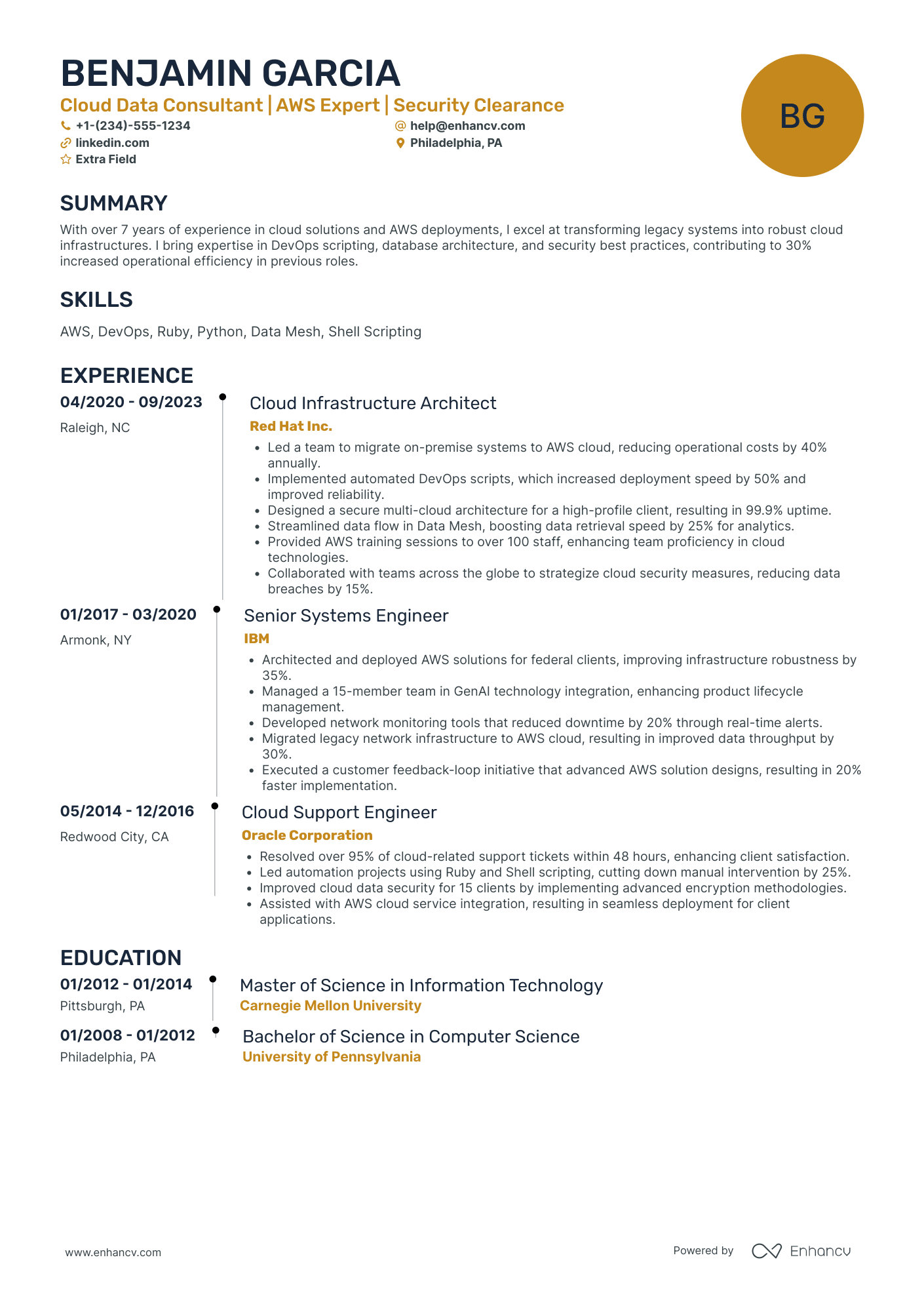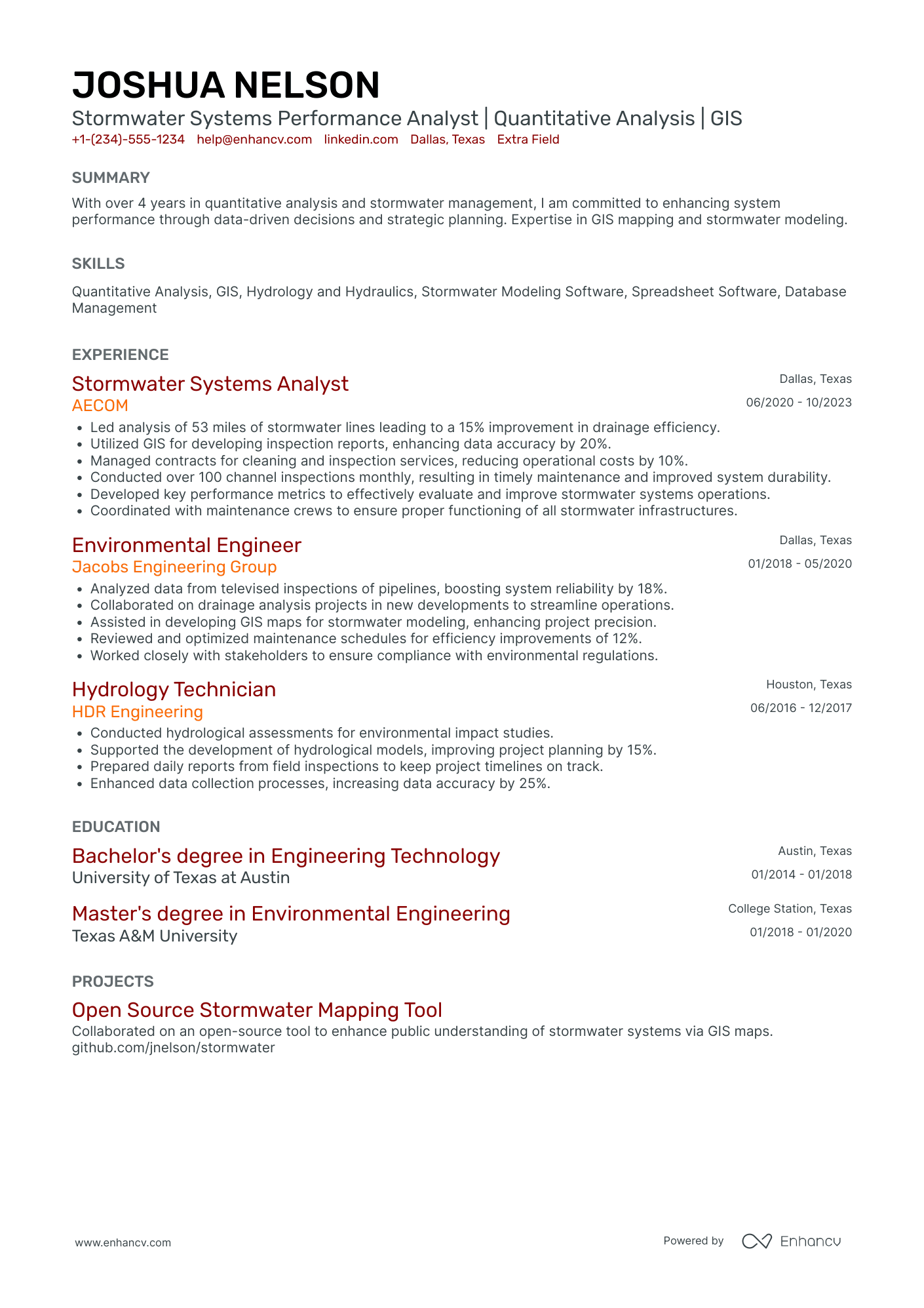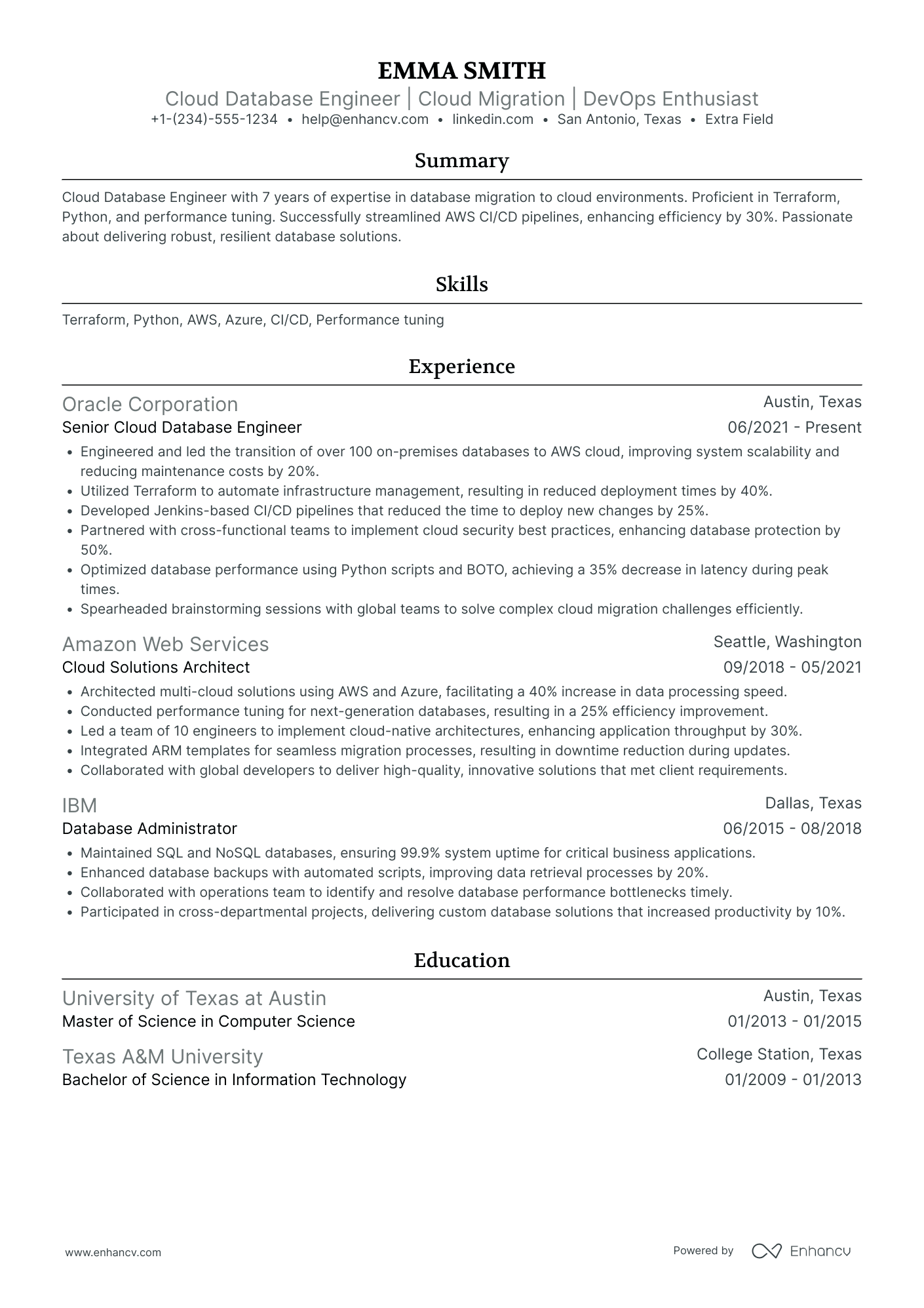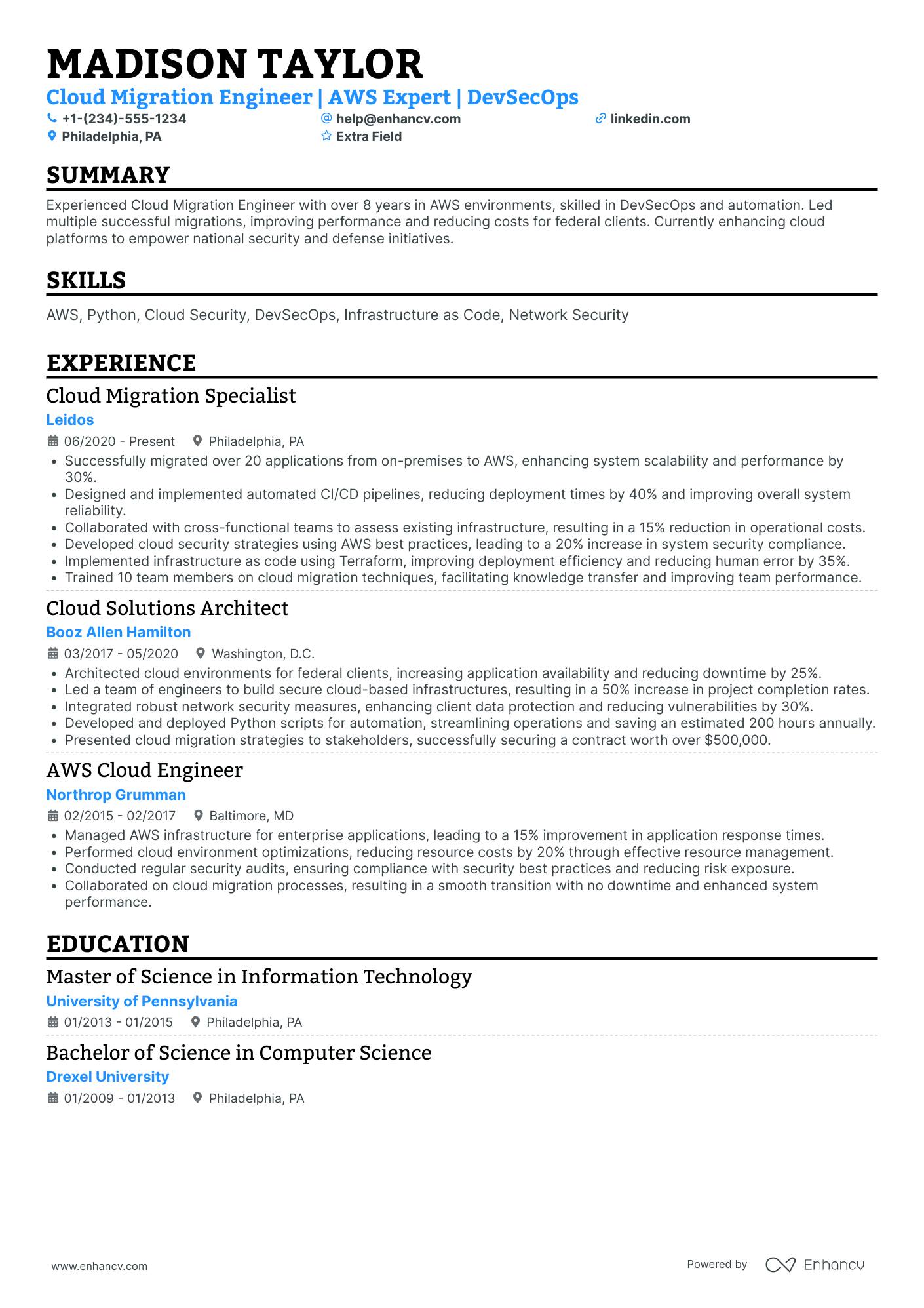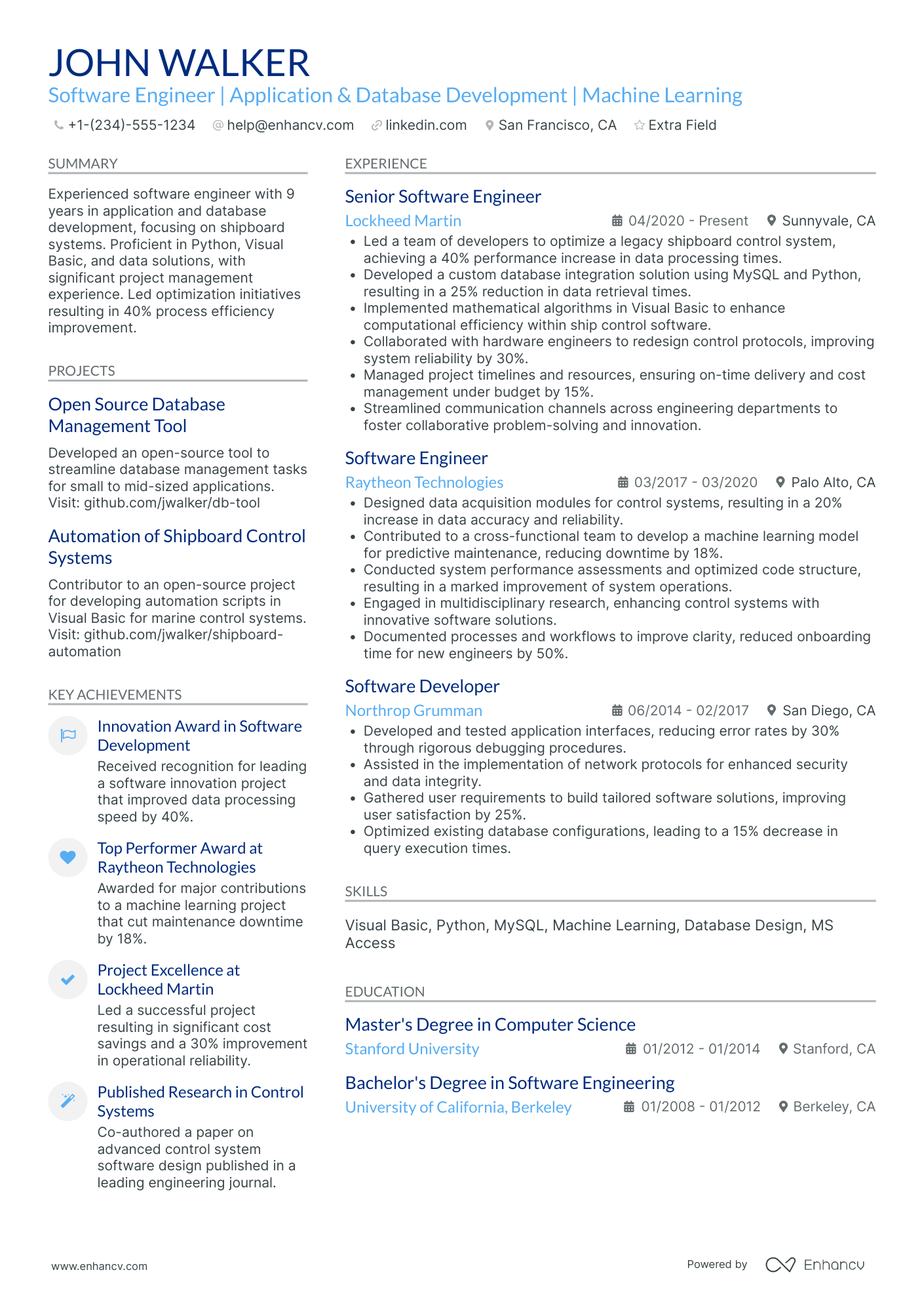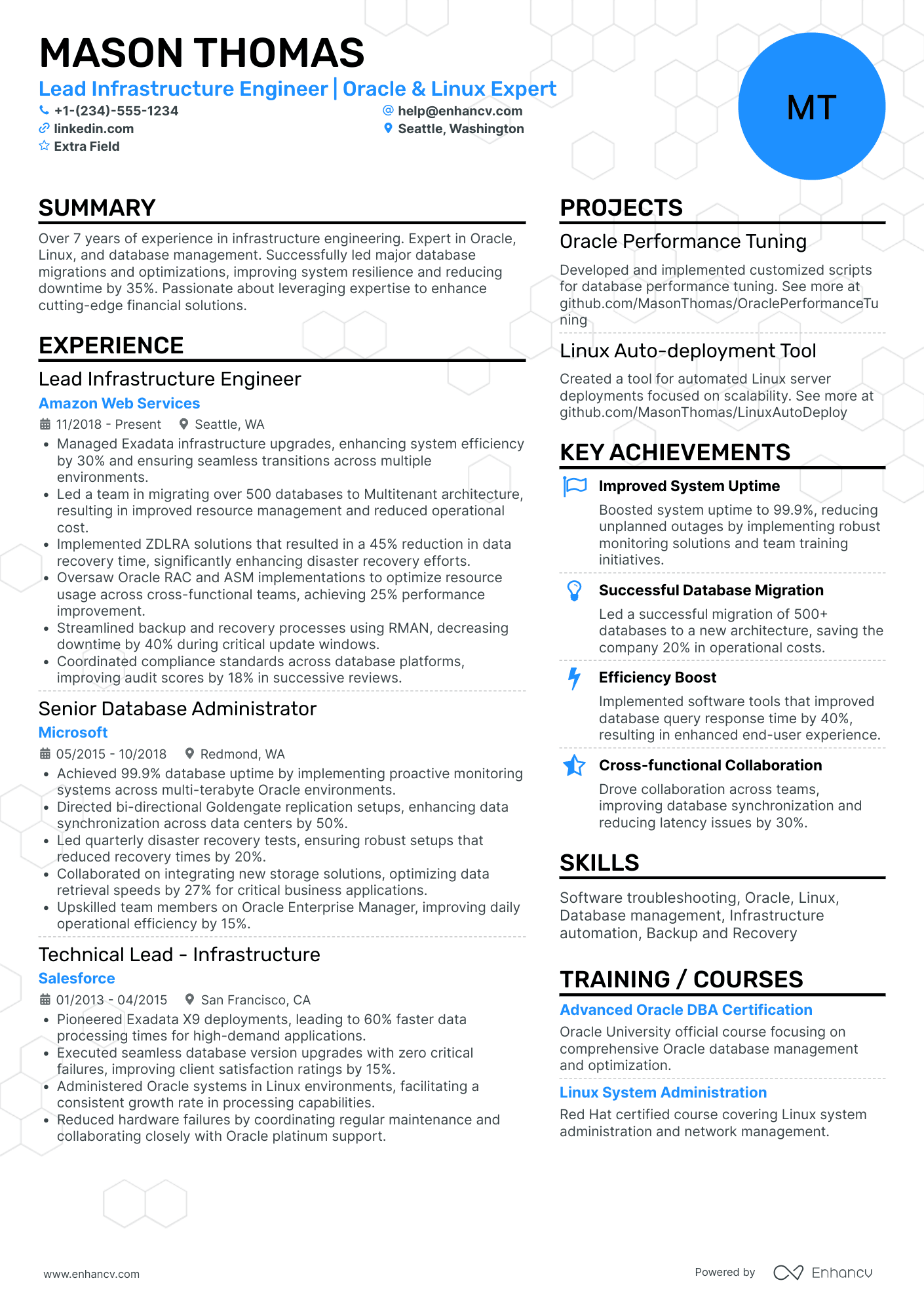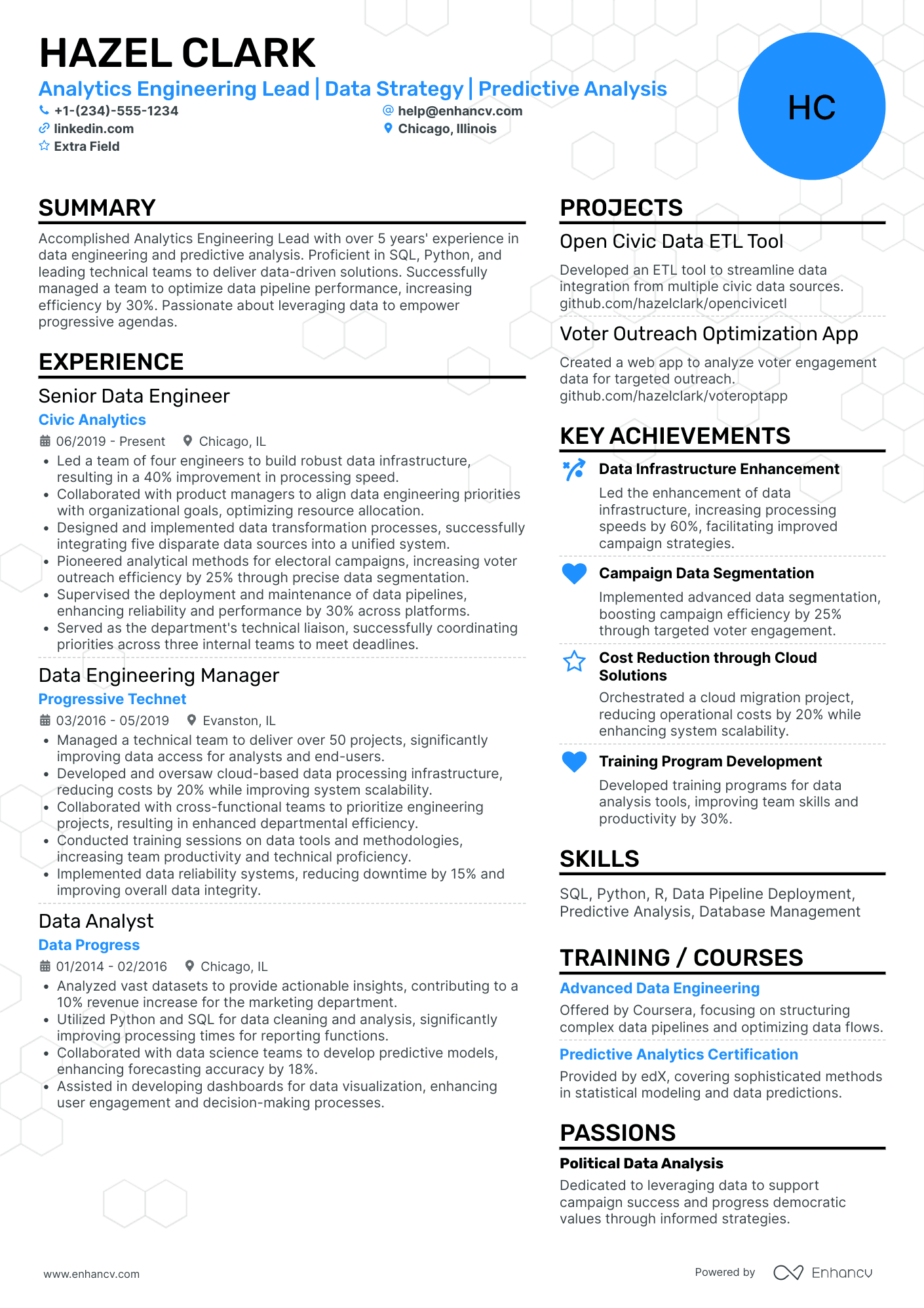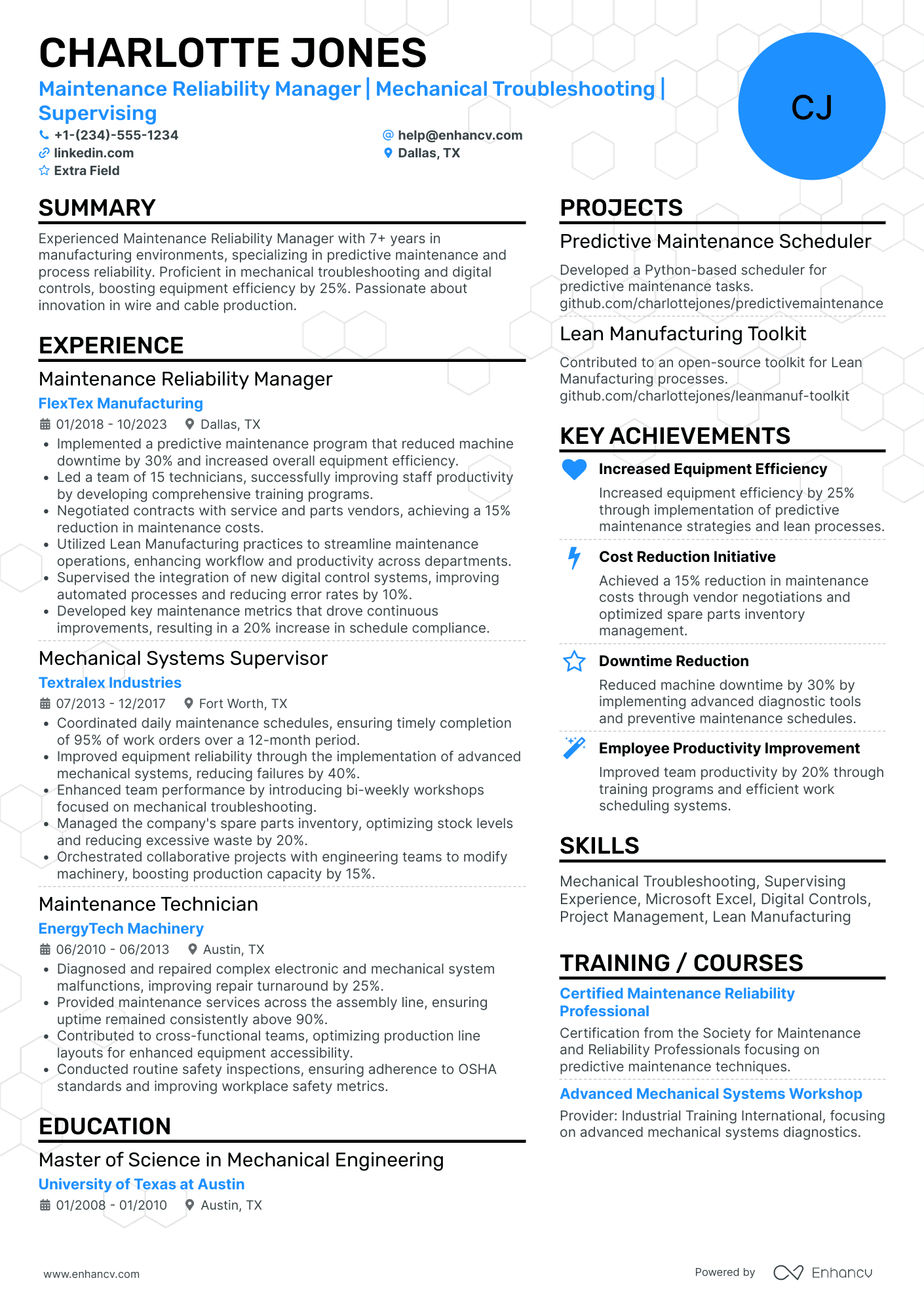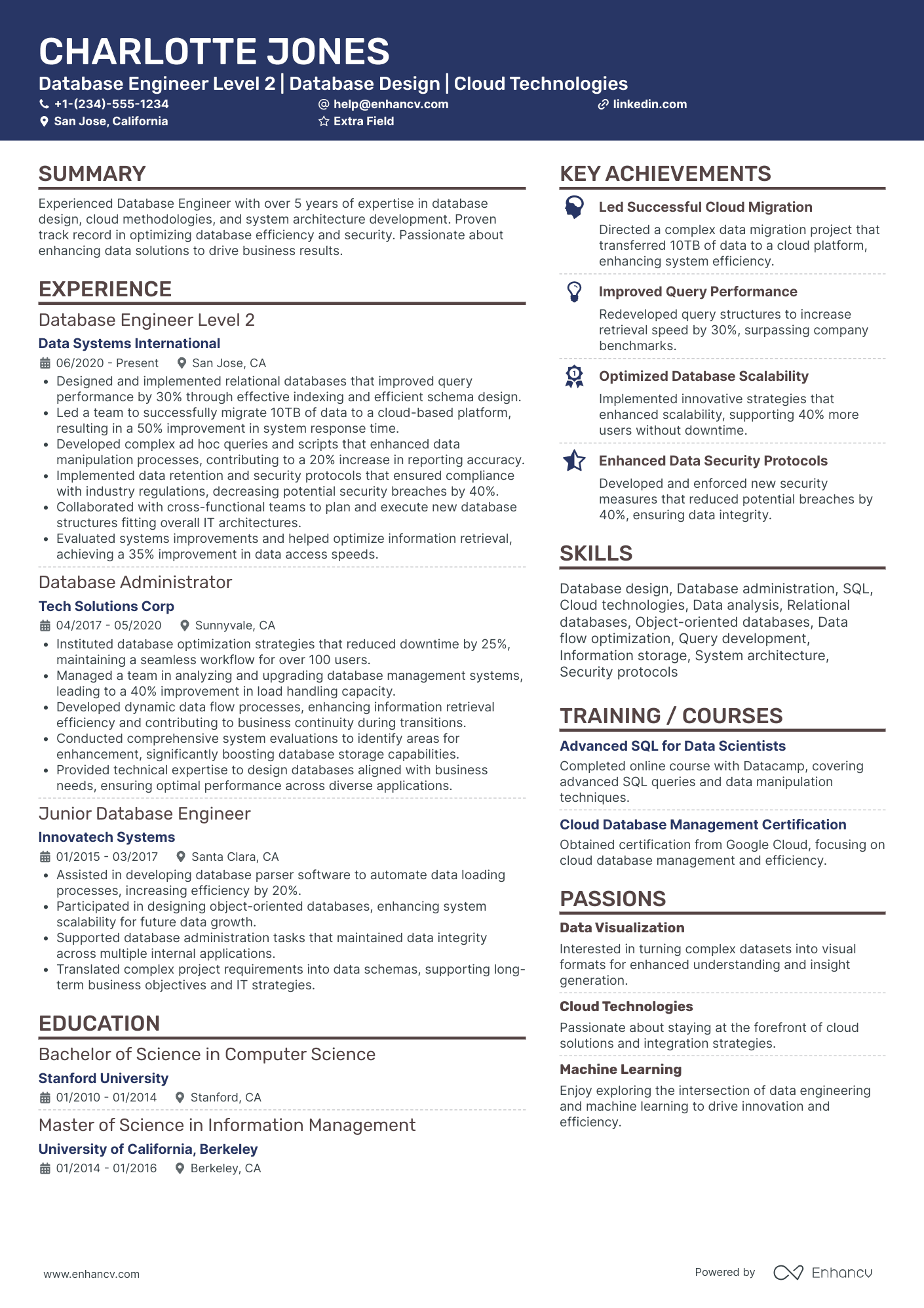As a database engineer, you might struggle with effectively showcasing your complex technical projects and diverse skill set on a resume. Our guide offers targeted strategies to help you distill these multifaceted experiences into concise, impactful statements that catch an employer's eye.
- The most straightforward and effective resume format, ensuring your database engineer resume stands out among numerous candidate profiles;
- The significance of the top one-third of your resume, including the header, summary or objective, and skills section, and its impact on recruiters;
- Frameworks and structures used by real database engineer professionals, offering insights on how to enhance your resume with industry-specific expertise;
- A variety of database engineer resume sections that bolster your profile, showcasing your comprehensive capabilities and distinctiveness.
Gaining insights from the best has never been easier. Explore more database engineer resume examples below:
Simple guide to your database engineer resume format and layout
Successful database engineer resumes all have one specific characteristic - candidates have invested in a simple resume layout . One that is easy to read, makes a good first impression, and is adapted to their professional experience. There are three distinct resume formats to help you focus on your:
- professional experience - use the reverse-chronological resume format;
- skills and achievements - via the functional skill-based resume format;
- both experience and skills - with a hybrid resume format .
What is more, keep in mind that your resume may be initially assessed by the ATS (Applicant Tracker System) (or the software used by companies in the hiring process). The database engineer resumes that suit the ATS:
- have a header that includes either a role keyword or the job you're applying for;
- should be no longer than two pages;
- be submitted as PDF, unless specified otherwise.
Your resume should match the market – Canadian applications, for instance, may use a different layout.
Upload & Check Your Resume
Drop your resume here or choose a file. PDF & DOCX only. Max 2MB file size.
PRO TIP
If you're in the process of obtaining your certificate or degree, list the expected date you're supposed to graduate or be certified.
Database engineer resume sections to answer recruiters' checklists:
- Header to help recruiters quickly allocate your contact details and have a glimpse over your most recent portfolio of work
- Summary or objective to provide an overview of your career highlights, dreams, and goals
- Experience to align with job requirements and showcase your measurable impact and accomplishments
- Skills section/-s to pinpoint your full breadth of expertise and talents as a candidate for the database engineer role
- Education and certifications sections to potentially fill in any gaps in your experience and show your commitment to the industry
What recruiters want to see on your resume:
- Proficiency in SQL and experience with various database management systems (e.g., MySQL, PostgreSQL, MongoDB, Oracle).
- Understanding of database design principles, normalization, and schema development.
- Experience with database optimization, performance tuning, and troubleshooting.
- Familiarity with data modeling tools and techniques, ETL processes, and data warehousing solutions.
- Knowledge of database security practices, backup and recovery techniques, and disaster recovery planning.
The database engineer resume experience section: a roadmap to your expertise
The resume experience section provides you with an opportunity to tell your professional narrative.
Recruiters, reading between the lines of your resume, use the experience section to better understand your unique skill set, accomplishments, and what unique value you bring about.
Discover five quick steps on how to write your experience section:
- Curate only relevant experience items to the role and include the company, description, and dates; all followed by up to six bullets per experience item;
- Each experience item should feature tangible results of your actions - if you can include a number or percent, this will further highlight your aptitude;
- If you've received any managerial or customer feedback, use short excerpts of it as further social proof of your technical or people skills;
- Make sure you're using the appropriate verb tense when listing your responsibilities;
- Within the description for each role, you could summarize your most noteworthy and relevant achievements.
Now, take note of how a real-world database engineer professional received opportunities at industry leaders with these resume experience sections:
- Led the migration of a 10TB on-premise Oracle database to AWS RDS, improving performance by 40% and reducing costs by 30%.
- Managed the implementation of new database security protocols in compliance with GDPR, successfully passing an external audit with zero non-conformances.
- Developed and optimized 50+ SQL stored procedures and ETL scripts that reduced data processing time by 25%, significantly enhancing reporting capabilities.
- Established automated data pipelines using Python and SQL for 15 disparate data sources, ensuring accurate and timely data availability for business analysts.
- Spearheaded a cross-functional team to design and deploy a company-wide data warehouse, enabling unified reporting and analytics.
- Received the 'Innovation Award' for designing a near real-time data synchronization system between operational databases and data lakes.
- Optimized index strategies for Microsoft SQL Server databases, resulting in a 35% improvement in transactional processing speeds for critical business applications.
- Architected a disaster recovery and high availability solution that achieved 99.9% uptime, far exceeding industry standards.
- Played a pivotal role in the decommissioning of legacy systems, successfully migrating 20 years of historical data without data loss.
- Successfully designed and implemented a multi-region PostgreSQL database architecture supporting a global SaaS platform with 99.99% uptime.
- Automated complex database maintenance tasks using Ansible, reducing manual effort by 70% and minimizing the scope for human error.
- Collaborated with the DevOps team to integrate CI/CD practices into the database deployment process, resulting in a 50% decrease in time-to-market for new features.
- Initiated and completed the company's first usage of NoSQL databases for handling unstructured data, which facilitated advanced data analytics and machine learning projects.
- Coordinated with the data science team to build a dynamic data ingestion framework that processed over 1 billion records daily from social media APIs.
- Introduced database monitoring and alerting systems that decreased incident response times by 40%, maintaining high system reliability.
- Implemented a T-SQL scripting initiative optimizing batch jobs, which resulted in a reduction of nightly job runtimes by 60%.
- Deployed database replication features between production and reporting servers, enabling near real-time business intelligence without impacting transactional workloads.
- Mentored a team of 5 junior database engineers and analysts, improving the overall team productivity and knowledge sharing within the department.
- Developed a scalable data model to support a rapid 300% user growth of an online platform within 12 months, maintaining database performance.
- Integrated database performance tuning as an ongoing process, identifying bottlenecks and optimizing queries which helped in sustaining sub-second response times.
- Co-authored a white paper on the effective use of database partitioning that was recognized by the industry at a leading tech conference.
- Developed a comprehensive data dictionary and ERD documentation process for all new database designs, improving team collaboration and data governance.
- Took charge of database schema changes and version control with minimal downtime during deployment, enabling swift and continuous application delivery.
- Pioneered the implementation of row-level security policies within the databases to ensure compliance with customer privacy standards.
- Leveraged machine learning to automatically adjust database scaling parameters in real-time, resulting in a 20% cost saving on database resources.
- Piloted a blockchain-based data integrity solution for transactional databases in FinTech applications, increasing trust and security among our banking clients.
- Collaborative work with front-end teams to integrate GraphQL APIs with the database backend, leading to a 30% reduction in development time for new app features.
- Directed the successful migration of a complex data ecosystem from a monolithic architecture to a microservices-based approach using Docker containers.
- Crafted and executed a strategic initiative to optimize data flow between apps and databases, vastly enhancing system throughput and reliability.
- Championed the execution of an organization-wide data governance framework, significantly bolstering data quality and operational decision-making.
The following content includes information from "O*NET OnLine" by the U.S. Department of Labor, Employment and Training Administration (USDOL/ETA). Used under the CC BY 4.0 license. The data represents the top responsibilities present on the task lists for database engineer professionals.
Top Responsibilities for Database Engineer:
- Modify existing databases and database management systems or direct programmers and analysts to make changes.
- Plan, coordinate, and implement security measures to safeguard information in computer files against accidental or unauthorized damage, modification or disclosure.
- Plan and install upgrades of database management system software to enhance database performance.
- Specify users and user access levels for each segment of database.
- Test changes to database applications or systems.
- Test programs or databases, correct errors, and make necessary modifications.
- Train users and answer questions.
- Provide technical support to junior staff or clients.
- Approve, schedule, plan, and supervise the installation and testing of new products and improvements to computer systems, such as the installation of new databases.
- Develop standards and guidelines for the use and acquisition of software and to protect vulnerable information.
Quantifying impact on your resume
- Highlight the volume of data you managed by stating the size of databases in terabytes or gigabytes to showcase your ability to handle large and complex datasets.
- Specify the percentage reduction in query response time achieved through optimization efforts to demonstrate efficiency improvements.
- Illustrate the growth in database performance with metrics like transactions per second to show scalability impacts.
- State the number of data models designed or optimized, reflecting your breadth of experience in structuring data effectively.
- Mention the quantity of backup and recovery strategies implemented to emphasize your role in ensuring data integrity and availability.
- Quantify the number of custom database solutions provided to meet unique business requirements, showcasing problem-solving abilities.
- Record the percentage increase in data accuracy or reduction in data redundancy from data cleansing activities to highlight data quality improvements.
- Present the number of users supported or concurrent connections handled to indicate your capacity to manage user loads.
Action verbs for your database engineer resume
Lacking relevant database engineer resume experience?
Learn how to write your database engineer resume experience in spite of having no real-world (or applicable) experience for the job.
You should:
- Feature relevant projects or publications that could impress recruiters or showcase that you have the basic skill set for the job
- Shift the focus towards your people (communication, organization, etc.) skills to demonstrate that you're a quick learner and can easily adapt to a new environment
- Use the resume objective to not only highlight your accomplishments but also map out how your career plans are perfectly aligned with the company's vision
- Select either the functional-skill-based resume format (that puts the focus on your skills) or the hybrid one (balancing expertise with skills).
Recommended reads:
PRO TIP
Always remember that your database engineer certifications can be quantified across different resume sections, like your experience, summary, or objective. For example, you could include concise details within the expertise bullets of how the specific certificate has improved your on-the-job performance.
Key hard skills and soft skills for your database engineer resume
At the top of any recruiter database engineer checklist, you'd discover a list of technical competencies, balanced with personal skills.
Hard or technical skills are your opportunity to show how you meet the essential responsibilities of the role. The ability to use a particular job-crucial technology or software would also hint to recruiters whether you'd need a prolonged period of on-the-job training - or you'd fit right in the job.
But to land your dream role, you'd also need to demonstrate a variety of soft or people resume skills . Employers care about soft skills as they show how each candidate would fit into the team and company culture.
Both types of skills are specific and to best curate them on your resume, you'd need to:
- Create a skill section within which you showcase your hard and soft skills and present how they help you succeed.
- List specific examples of projects, tasks, or competitions, within which your skill set has assisted your results.
- Soft skills are harder to measure, so think about situations in which they've helped you thrive. Describe those situations concisely, focusing on how the outcome has helped you grow as a professional.
- Metrics of success - like positive ROI or optimized workplace processes - are the best way to prove your technical and people skills.
Take a look at some of database engineer industry leaders' favorite hard skills and soft skills, as listed on their resumes.
Top skills for your database engineer resume:
SQL
NoSQL
Database Design
Data Modeling
Performance Tuning
ETL Processes
Backup and Recovery Solutions
Database Security
Cloud Databases
Database Management Systems (DBMS)
Problem-Solving
Attention to Detail
Communication
Team Collaboration
Time Management
Analytical Thinking
Adaptability
Critical Thinking
Project Management
Creativity
Next, you will find information on the top technologies for database engineer professonals from "O*NET OnLine" by the U.S. Department of Labor, Employment and Training Administration (USDOL/ETA). Used under the CC BY 4.0 license.
Top technologies for Database Engineer’s resume:
- Amazon DynamoDB
- Elasticsearch
- Apache Hive
- Blackboard software
- Google Angular
- Spring Framework
PRO TIP
Mention specific courses or projects that are pertinent to the job you're applying for.
The database engineer resume sections you may underestimate: certifications and education
Your education and certifications provide insight into both your technical capabilities and personal attributes, such as perseverance. When crafting your database engineer resume, consider how you present these elements:
- For your higher education degrees, prioritize listing those most relevant to the job or indicative of your academic dedication;
- Include applicable coursework as a stand-in for relevant experience or if it might impress recruiters;
- Include incomplete higher education only if it's pertinent to meeting job requirements;
- If your degree is from a renowned university, mention how often you made the Dean's list to underline academic excellence.
Regarding certifications, it's not necessary to list all of them. Instead, match up to three of your most recent or significant certificates with the technical skills required in the job description.
Below, we've selected some of the top industry certifications that could be vital additions to your database engineer resume.
The top 5 certifications for your database engineer resume:
- Oracle Certified Professional, MySQL 5.7 Database Administrator (OCP) - Oracle
- Microsoft Certified: Azure Database Administrator Associate (MCADAA) - Microsoft
- IBM Certified Database Administrator – DB2 (IBM DB2 DBA) - IBM
- Certified Data Management Professional (CDMP) - DAMA International
- Amazon Web Services (AWS) Certified Database - Specialty (AWS DBS) - Amazon Web Services
The content below includes information from "O*NET OnLine" by the U.S. Department of Labor, Employment and Training Administration (USDOL/ETA). Used under the CC BY 4.0 license. The data represents the top associations for database engineer professionals.
Top US associations for a Database Engineer professional
- Association for Computing Machinery
- CompTIA
- Computing Research Association
- IEEE Computer Society
- Institute for Certification of Computing Professionals
PRO TIP
If you're in the process of obtaining your certificate or degree, list the expected date you're supposed to graduate or be certified.
Recommended reads:
Professional summary or objective for your database engineer resume
database engineer candidates sometimes get confused between the difference of a resume summary and a resume objective.
Which one should you be using?
Remember that the:
- Resume objective has more to do with your dreams and goals for your career. Within it, you have the opportunity to showcase to recruiters why your application is an important one and, at the same time, help them imagine what your impact on the role, team, and company would be.
- Resume summary should recount key achievements, tailored for the role, through your career. Allowing recruiters to quickly scan and understand the breadth of your database engineer expertise.
The resume objectives are always an excellent choice for candidates starting off their career, while the resume summary is more fitting for experienced candidates.
No matter if you chose a summary or objective, get some extra inspiration from real-world professional database engineer resumes:
Resume summaries for a database engineer job
- Seasoned database engineer with over 10 years of experience specializing in managing SQL databases and data warehousing solutions. Proficient in Oracle, SQL Server, and MySQL, with notable success in database architecture redesign that halved query response times for a high-traffic e-commerce platform.
- Driven professional with 8 years in network administration eager to transition into database engineering. Proven expertise in system security and software development, with a commitment to leveraging knowledge of Python and Java to improve database efficiency and stability for large-scale systems.
- Detail-oriented database engineer with a solid foundation in computer science and 5 years of hands-on experience in database management. Comprehensive skill set includes database optimization, disaster recovery planning, and mastery in PostgreSQL and MongoDB. Successfully scaled database systems to support a 150% increase in user load for a SaaS provider.
- Former Data Analyst with a strong background in statistical analysis and 6 years of professional experience. Aspiring to apply analytical skills and proficiency in R and SAS to transition into the realm of database engineering, aiming to enhance data integrity and optimize storage solutions for complex databases.
- Recent Computer Science graduate driven to build a career in database engineering. Enthusiastic about utilizing knowledge from academic projects in database design and eager to apply programming skills in Python and C++ to contribute to the development of robust and secure database systems.
- Adept problem-solver with a recent degree in Information Technology, seeking an entry-level position in database engineering. Eager to leverage understanding of algorithms, data structures, and knowledge of Java from internships and university labs to help create efficient and innovative data management solutions.
Optimize your resume summary and objective for ATS
Drop your resume here or choose a file.
PDF & DOCX only. Max 2MB file size.
Average salary info by state in the US for database engineer professionals
Local salary info for Database Engineer.” Source: My Next Move, National Center for O*NET Development. Accessed 10/15/2024
| State | Average Salary (in USD) |
|---|---|
| US National Average | $101,510 |
| California (CA) | $112,170 |
| Texas (TX) | $102,010 |
| Florida (FL) | $102,280 |
| New York (NY) | $98,110 |
| Pennsylvania (PA) | $97,100 |
| Illinois (IL) | $96,560 |
| Ohio (OH) | $94,510 |
| Georgia (GA) | $104,000 |
| North Carolina (NC) | $104,990 |
| Michigan (MI) | $97,760 |
Bonus sections for your database engineer resume
Looking to show more personality on your database engineer resume? Then consider including a couple of extra sections.
They'd benefit your application by highlighting your most prominent:
Key takeaways
At the end of our guide, we'd like to remind you to:
- Invest in a simple, modern resume design that is ATS friendly and keeps your experience organized and legible;
- Avoid just listing your responsibilities in your experience section, but rather focus on quantifiable achievements;
- Always select resume sections that are relevant to the role and can answer job requirements. Sometimes your volunteering experience could bring more value than irrelevant work experience;
- Balance your technical background with your personality traits across various sections of your resume to hint at how much time employers would have to invest in training you and if your profile would be a good cultural fit to the organization;
- Include your academic background (in the form of your relevant higher education degrees and certifications) to show recruiters that you have the technical basics of the industry covered.
Database Engineer resume examples
By Experience
By Role
